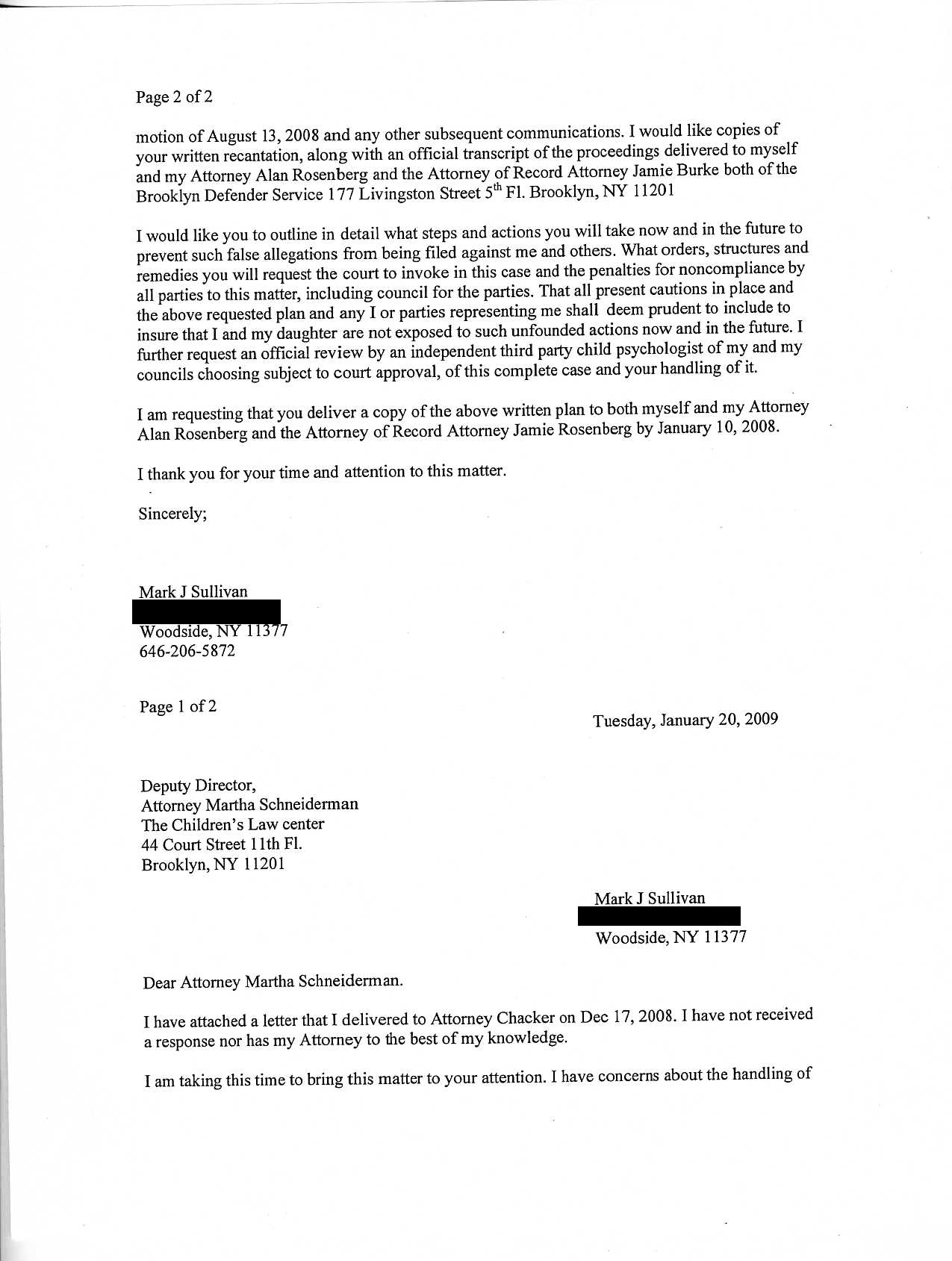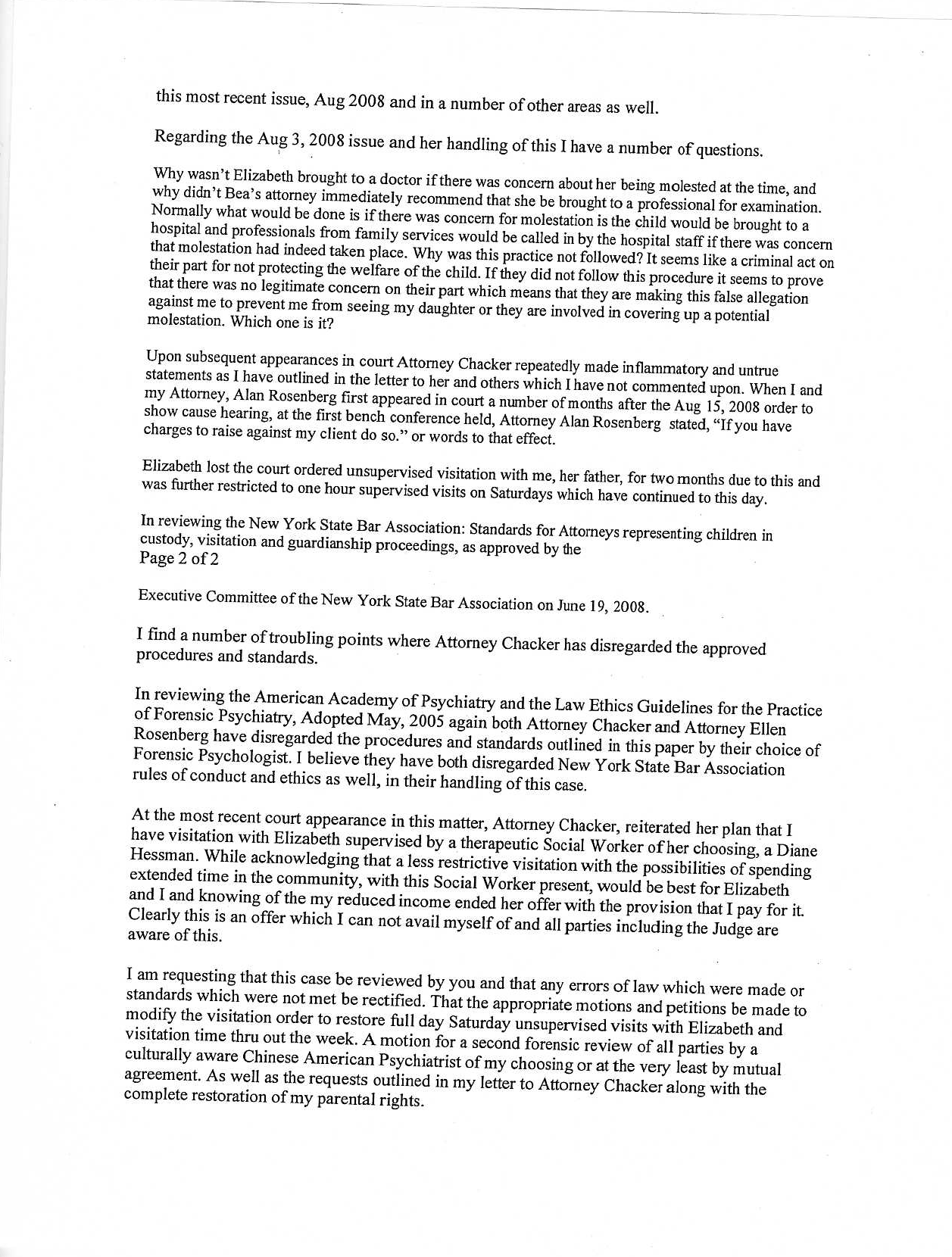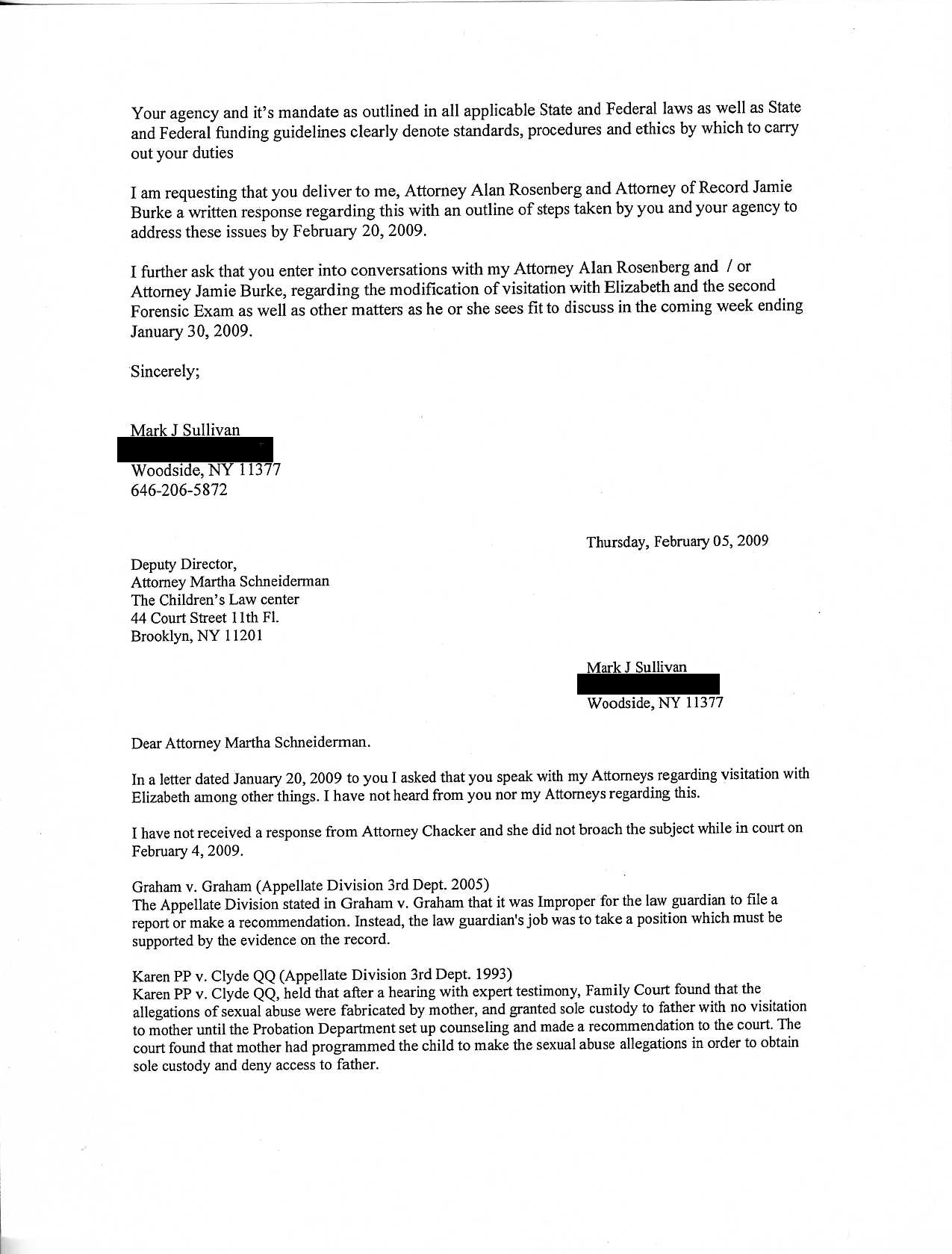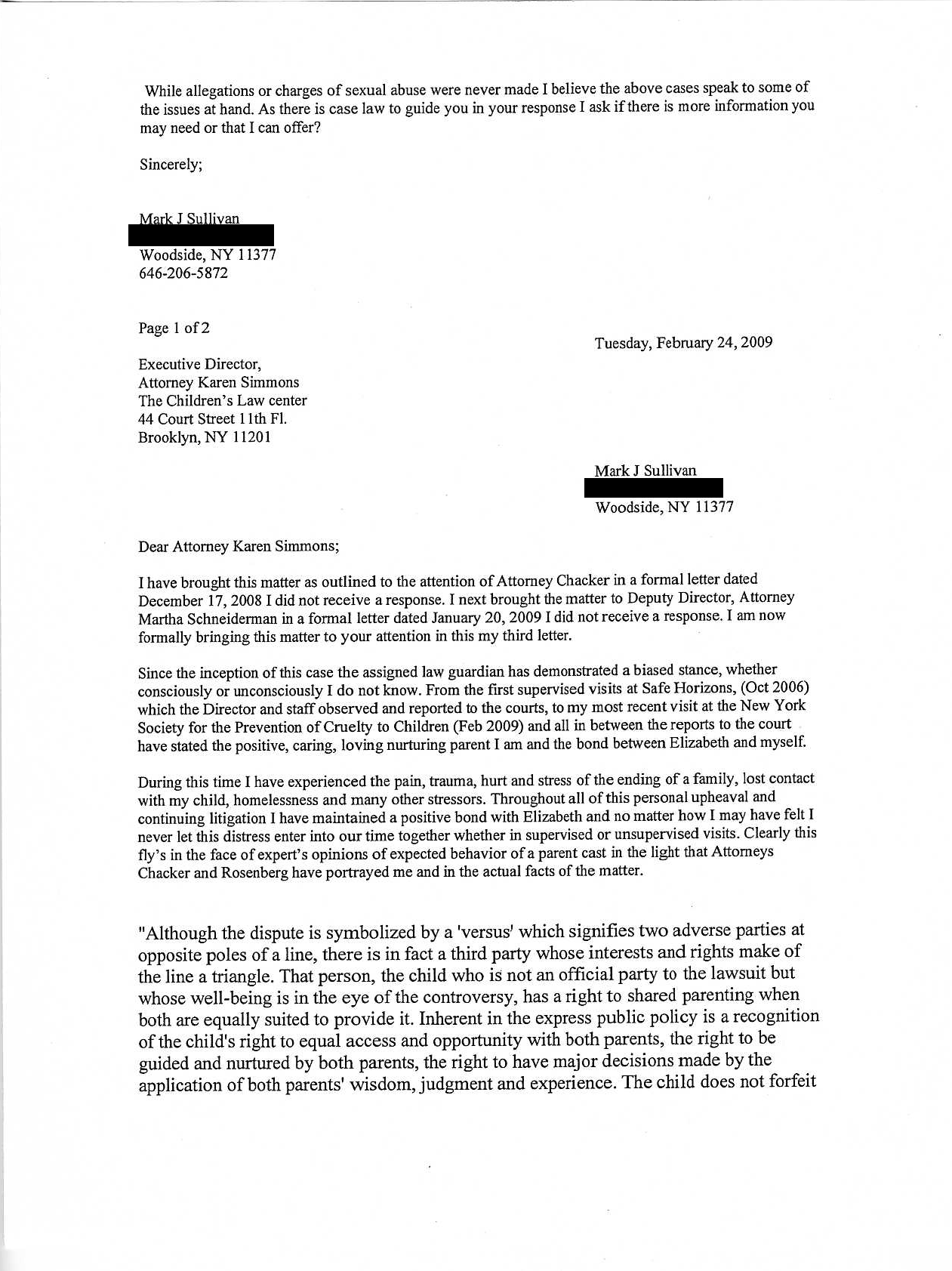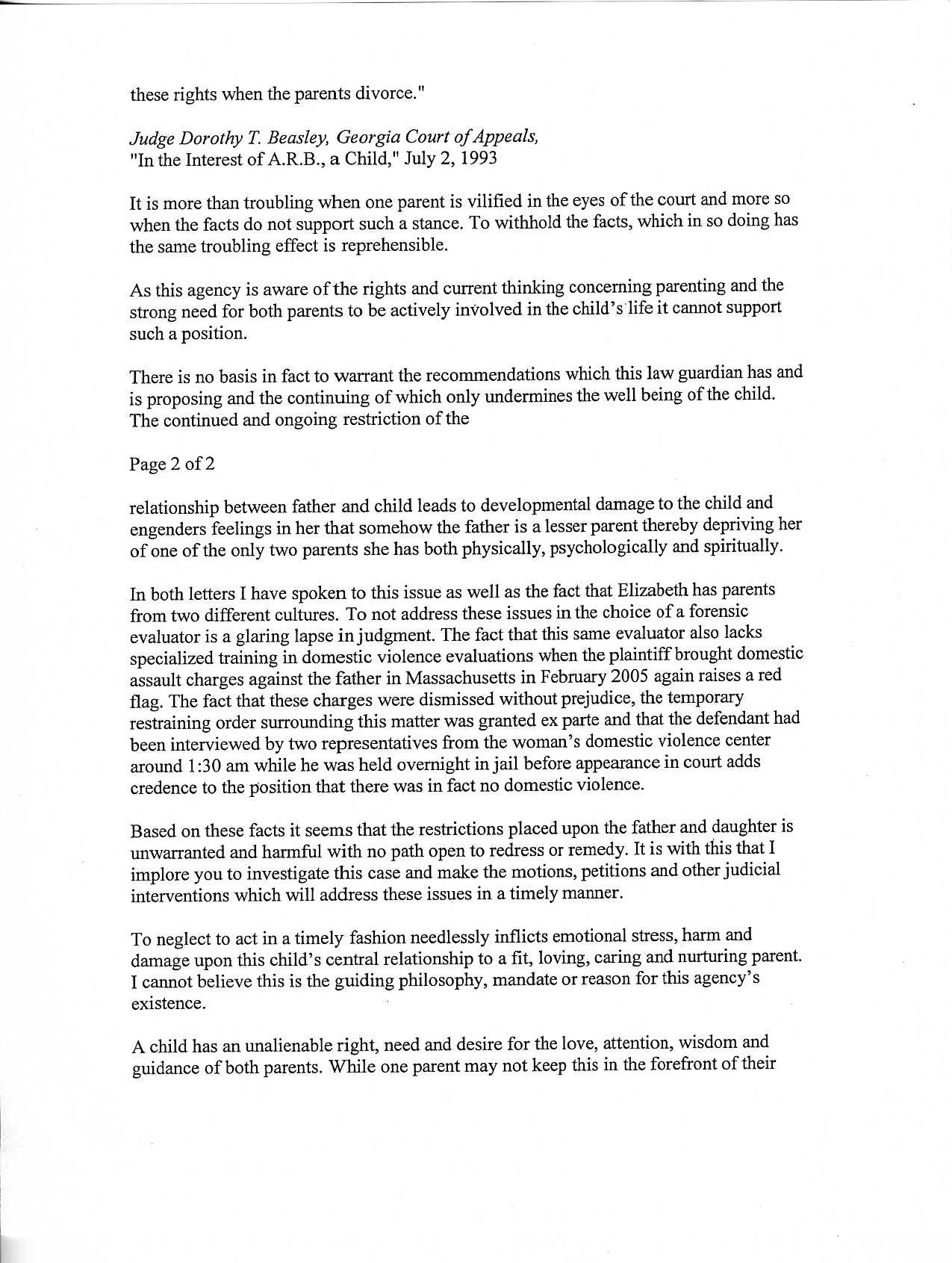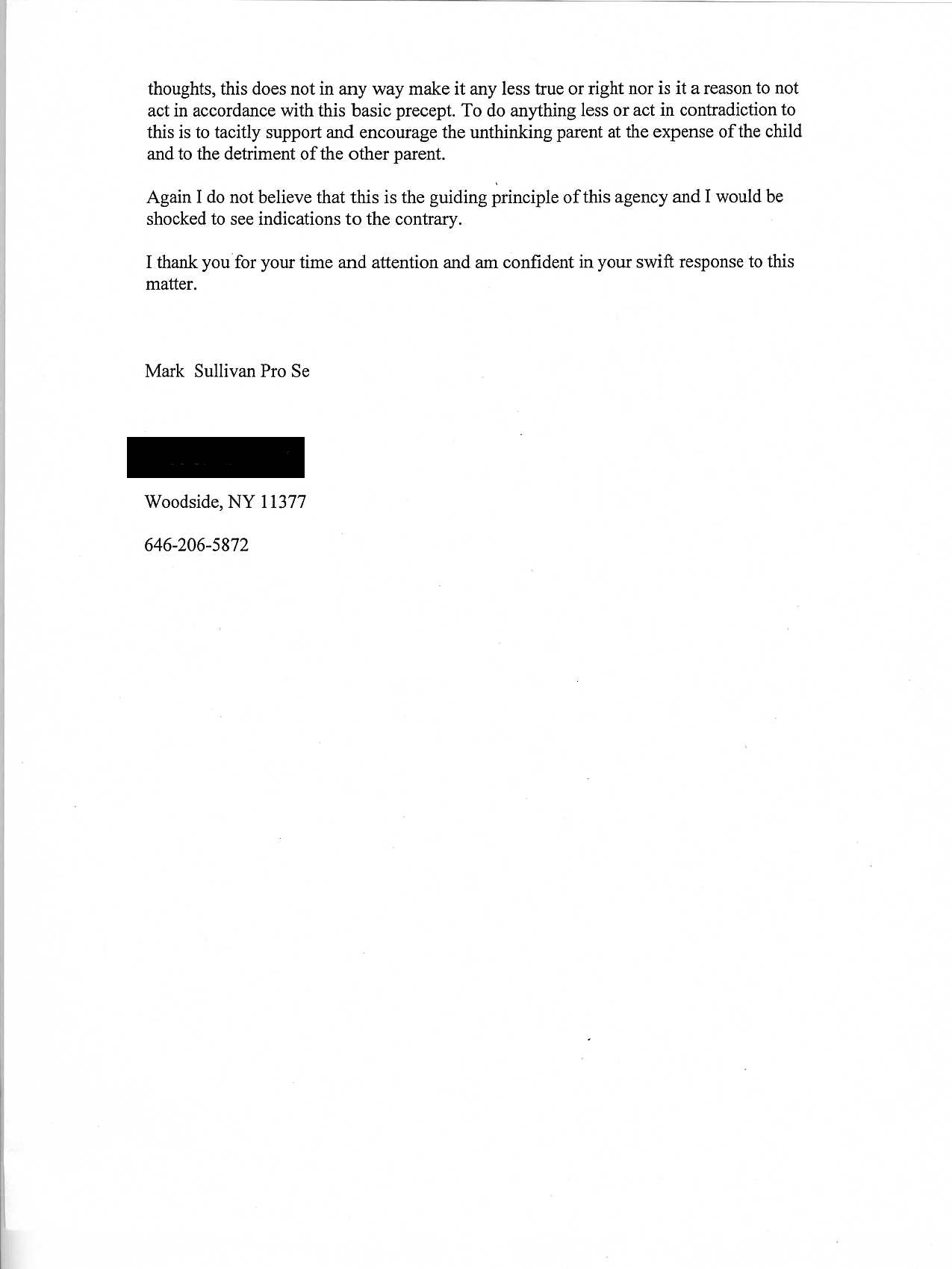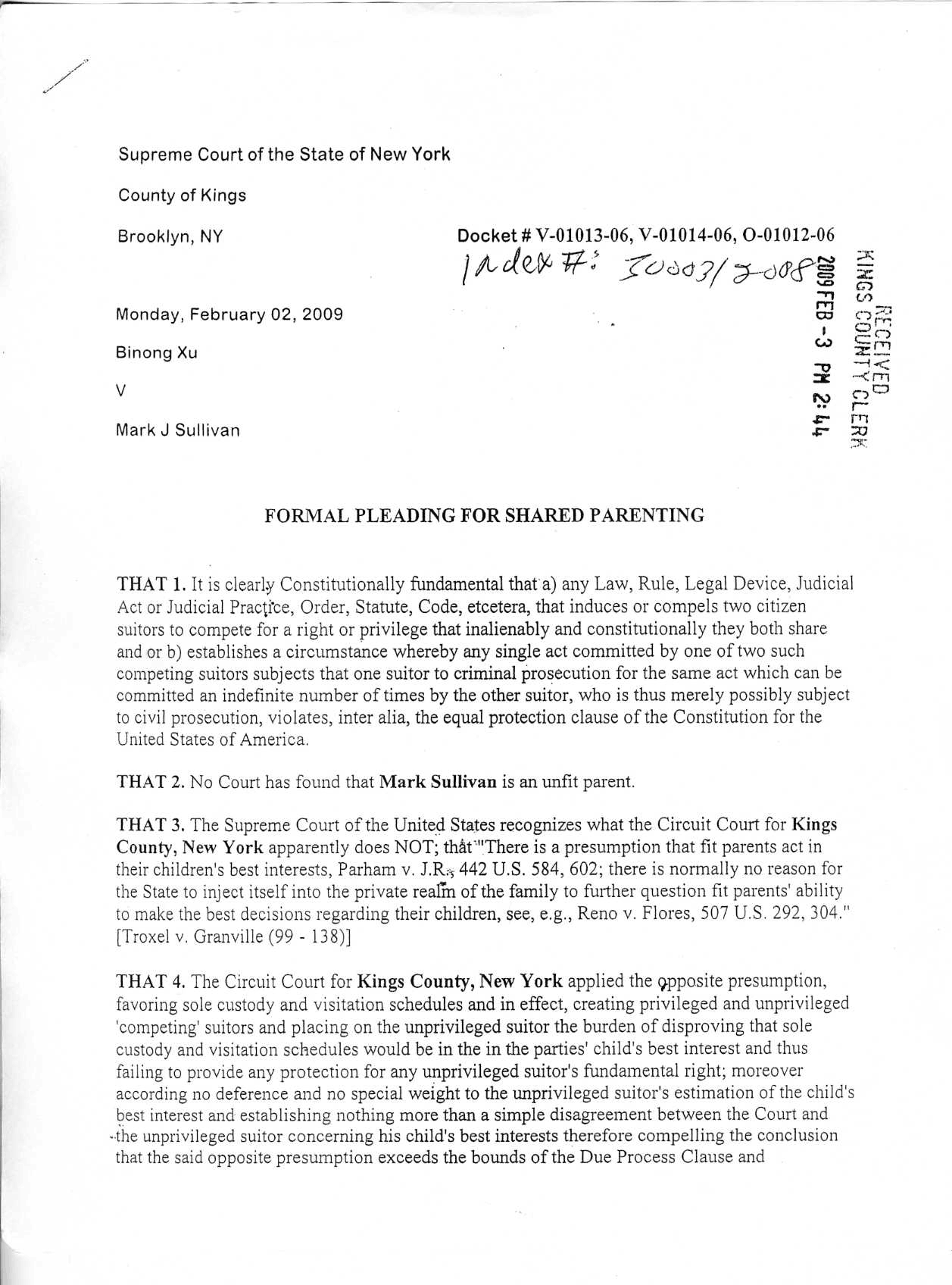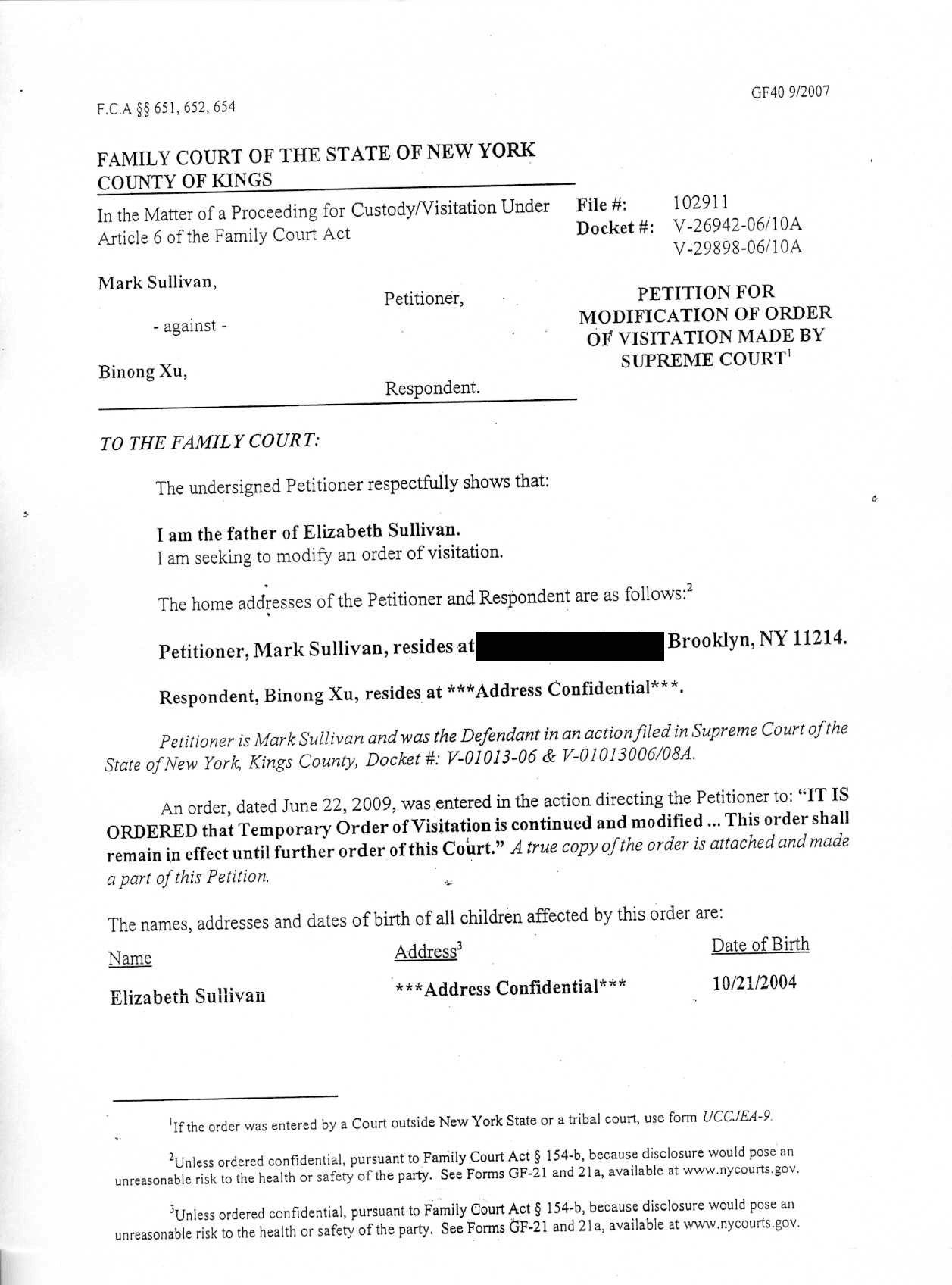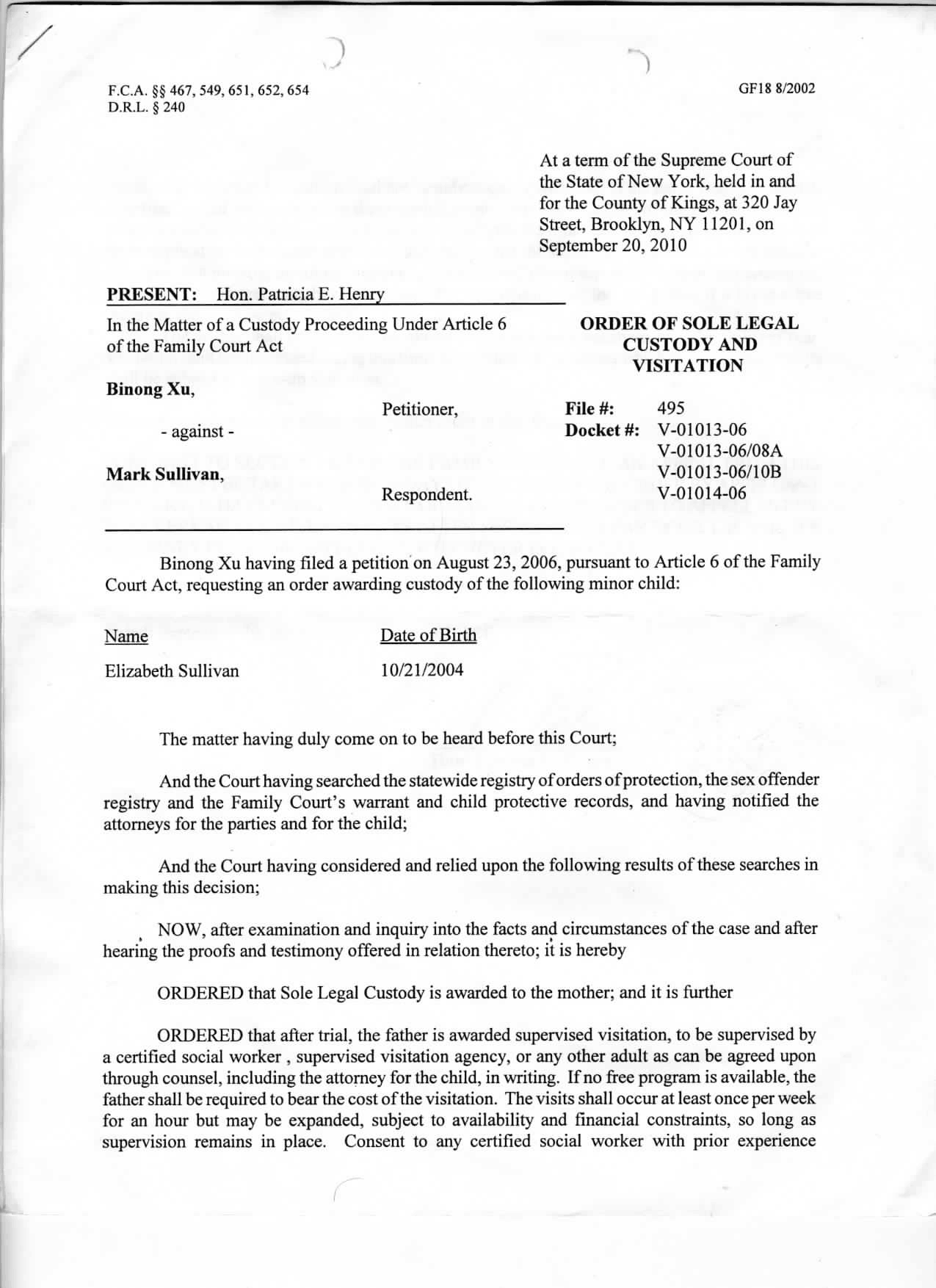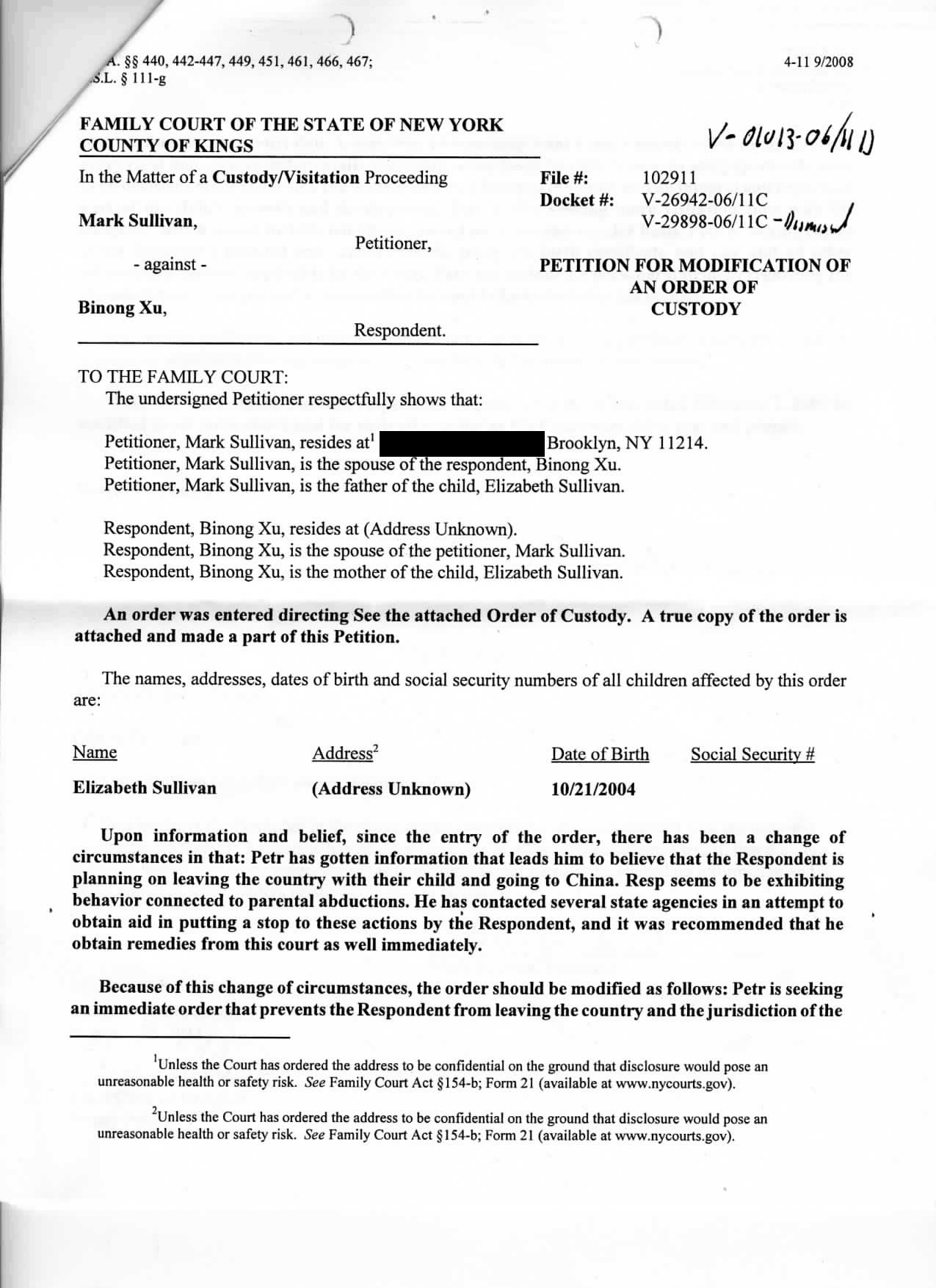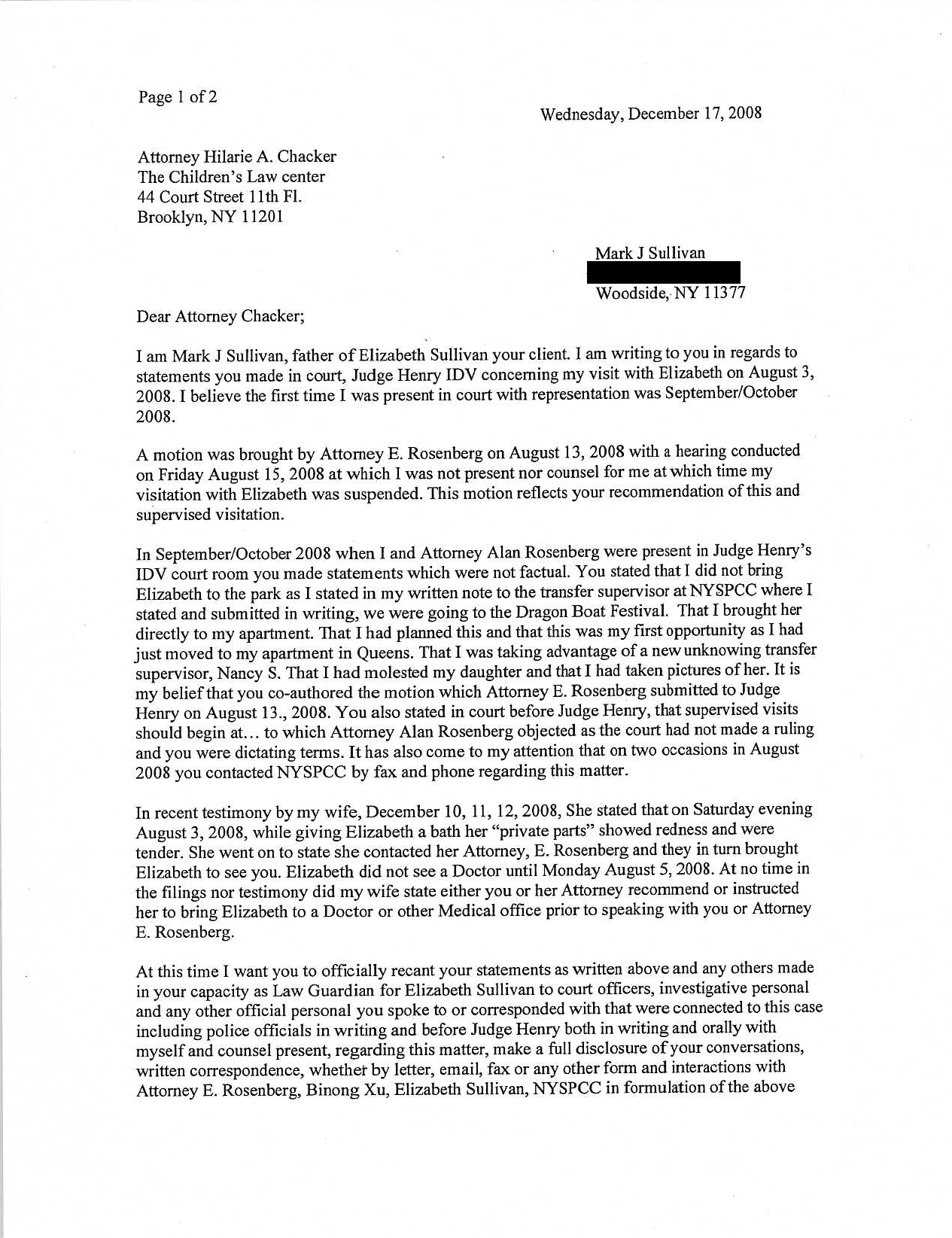How Elizabeth became fatherless ____ Court Documents
Formal Pleading for Shared Parenting
Petition for Modification of Visit (federal and constitutional law claims)
On Appeal to the Kings County IDV Court
Petition mod of custody March 2011
Formal letters Children's Law Center
---------------------------- Original Message ----------------------------
Subject: RE: civil rights case, Mark Sullivan
From: "Karni, Annie" <akarni@nypost.com>
Date: Mon, August 16, 2010 10:48 am
To: "Mark Sullivan" <mark@markjosephsullivanphotography.com>
--------------------------------------------------------------------------
thanks. im out of the office, will get back to you tomorrow
________________________________________
From: Mark Sullivan [mark@markjosephsullivanphotography.com]
Sent: Monday, August 16, 2010 10:28 AM
To: Karni, Annie
Subject: civil rights case, Mark Sullivan
Dear Ms Karni;
Attached are 3 documents related to a civil rights case. CV10-3626 I filed Aug 6th 2010.
Breifly... the plaintiff gave false statenments which she later recanted. The 2nd Law Guardian withheld fact and evidience which cast me in a negative light and has perpetuated this false baseless litigation. Attorney Oakes was the original LG.
in Aug 2008 both the LG and plaintiffs attorney, as mandated reporters did NOT report the statements of the plaintiff with in 48 hours, in fact never reported to the state.
Both of these organizations are non-profits which recevice state and federal funds and have abridged my and my daughters civil rights.
In the last 2 years I have seen my child just 36 times for as many hours and have never spend a christmas day or eve with her. I have never been found a threat or harm to my child and ACS has investigated this case and all reports by social workers have stated I am a loving caring father in tune with my daughter.
I have repeatedly sought to be heard as I am being treated unjustly but more importantly my daughter is denied the love, concern and caring of her father.
The unjust actions by the court and other parties are instilling in my child a deep pain and hurt which will result in an anger which will cast a destructive pollar over her life.
I fear the day when she.. in pain anger and hurt says.."I hate you! You were never there for me!" knowing that all the words, all the actions, all the explaining.... will not refute this fact.
My child as any child is to be valued, rather than to be cast upon the trash heap of a dysfuncial court system while others look on, mute in defense of this inhuman treatment.
--
Mark Sullivan
646-206-5872
mark@markjosephsullivanphotography.com
http://www.markjosephsullivanphotography.com
*&*
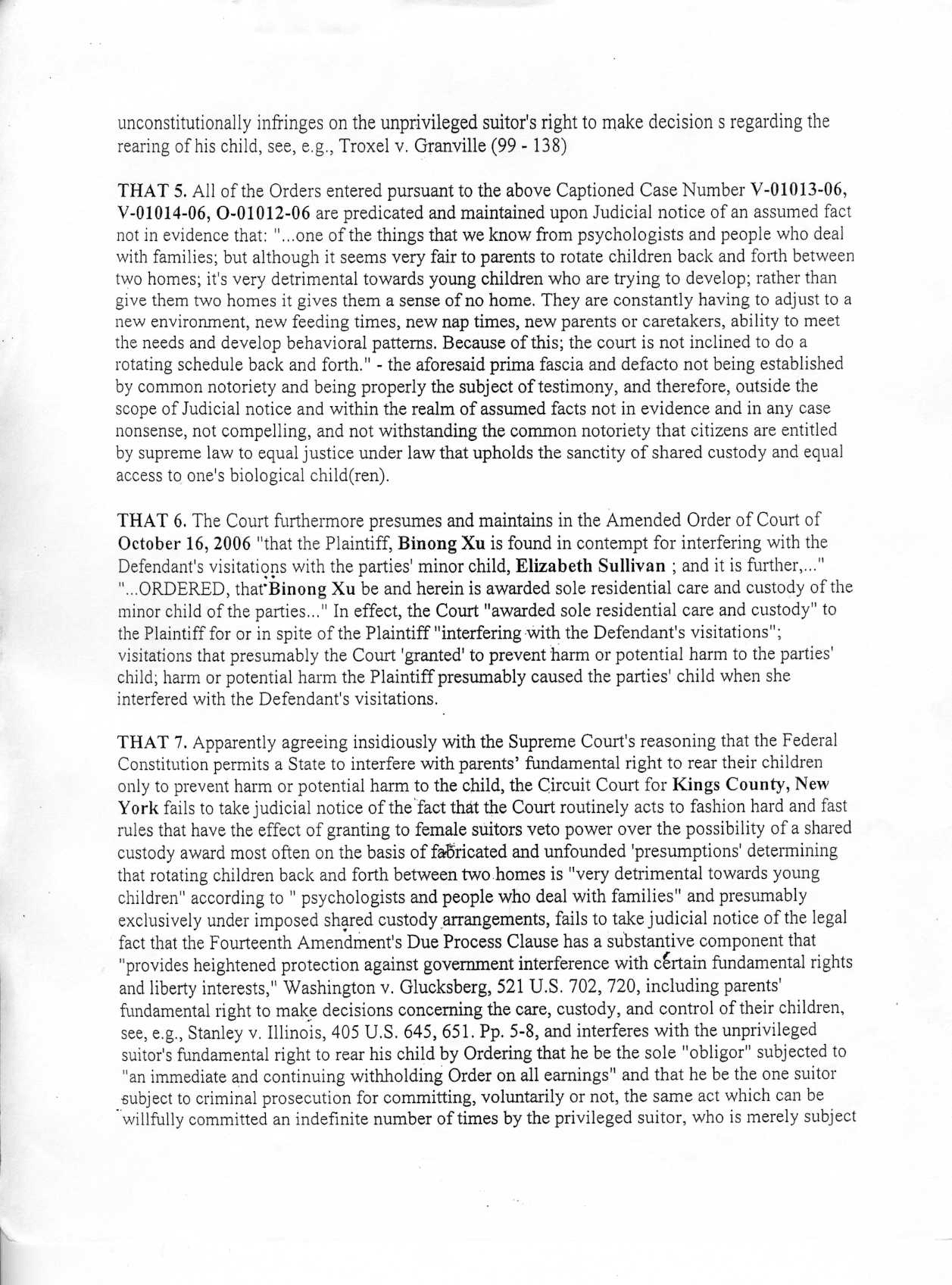
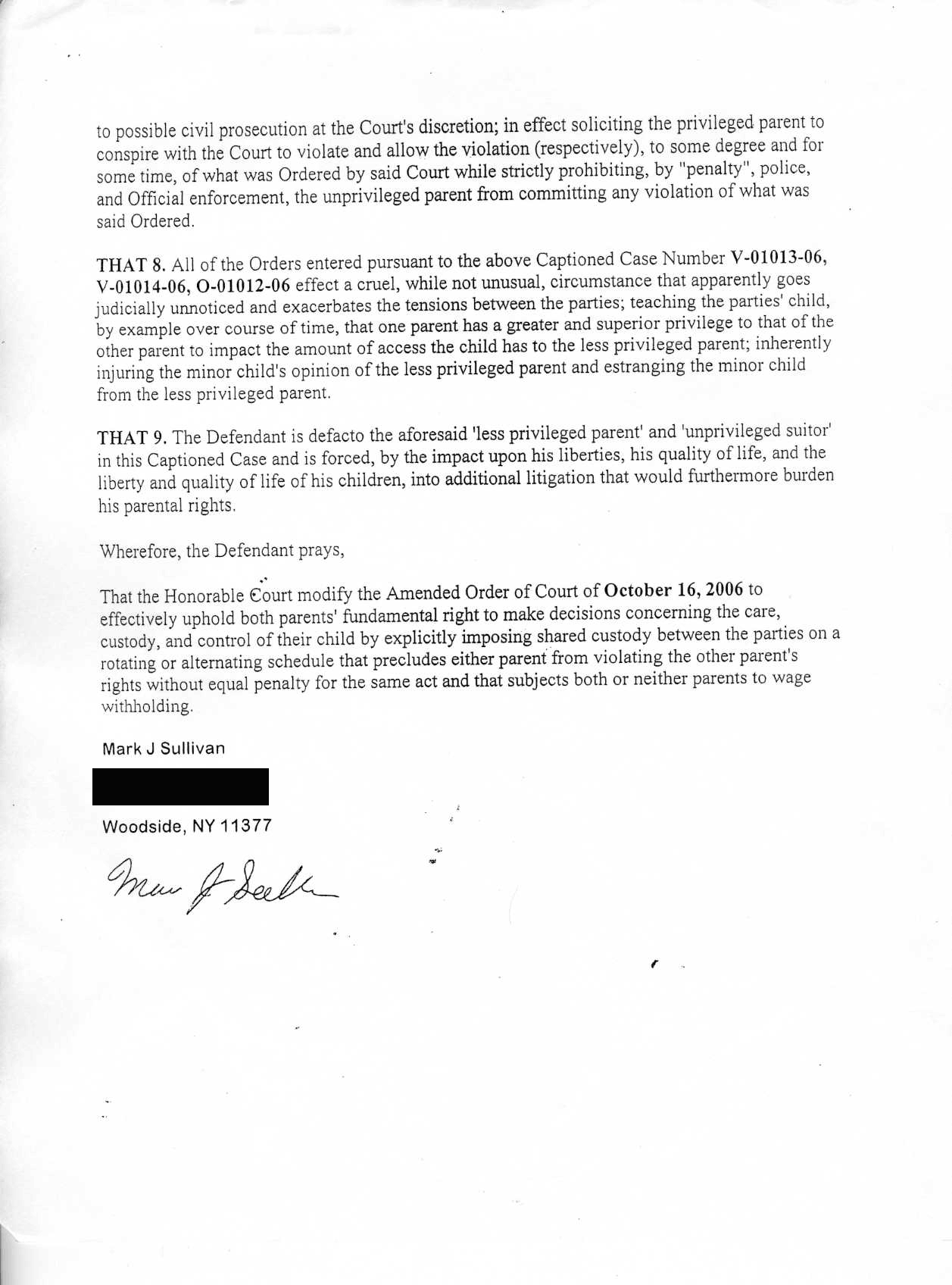
*&*
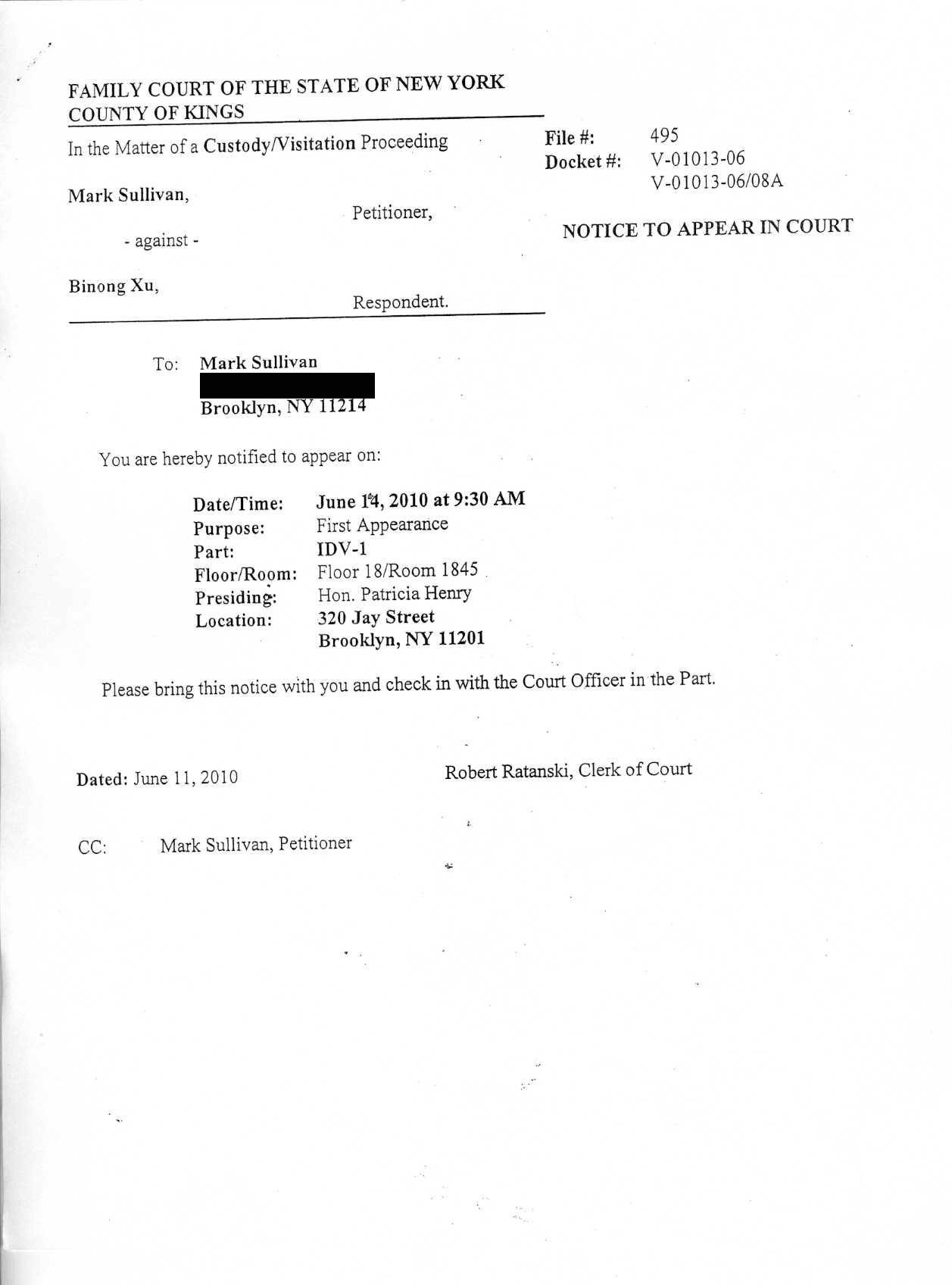
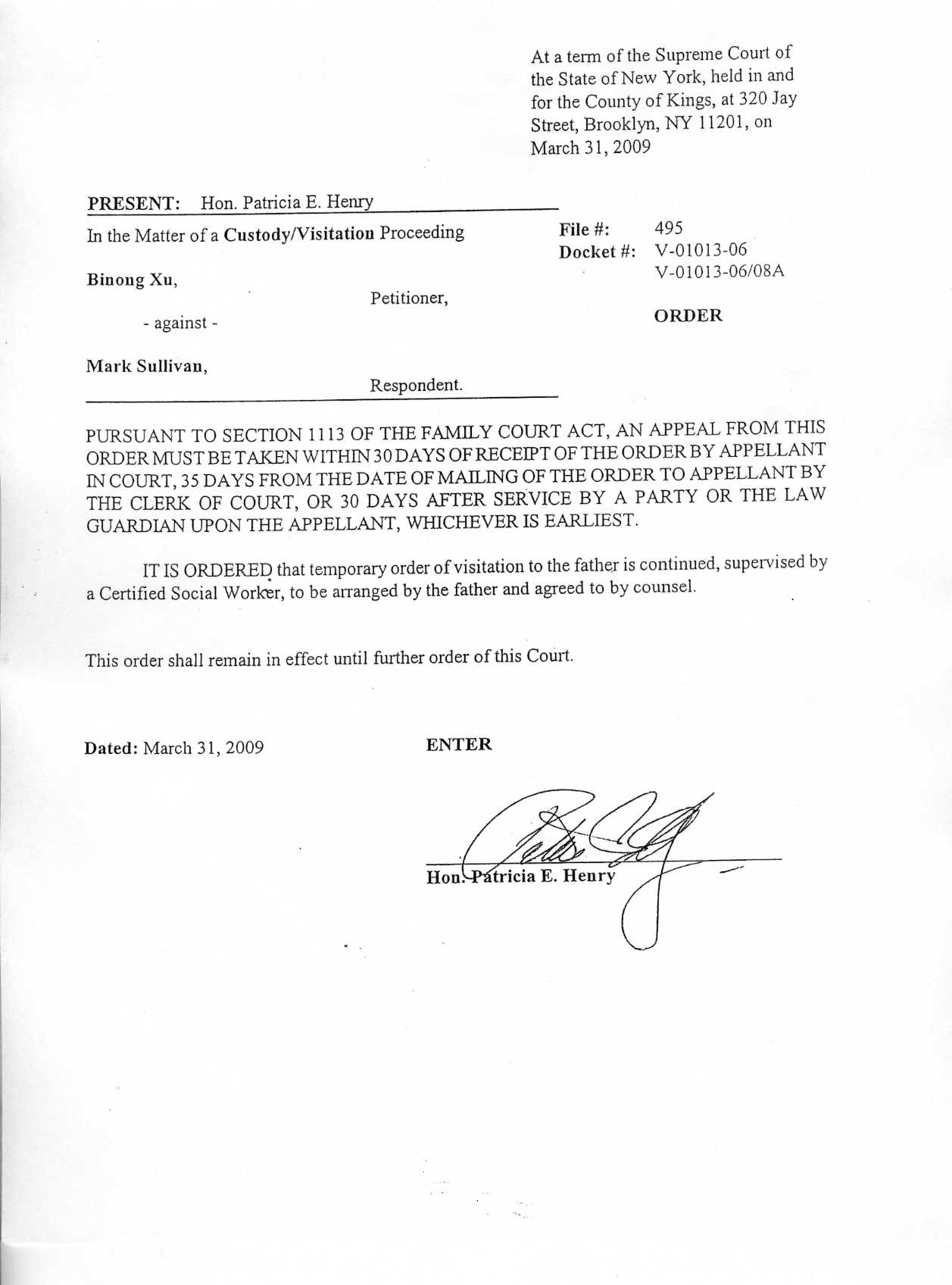
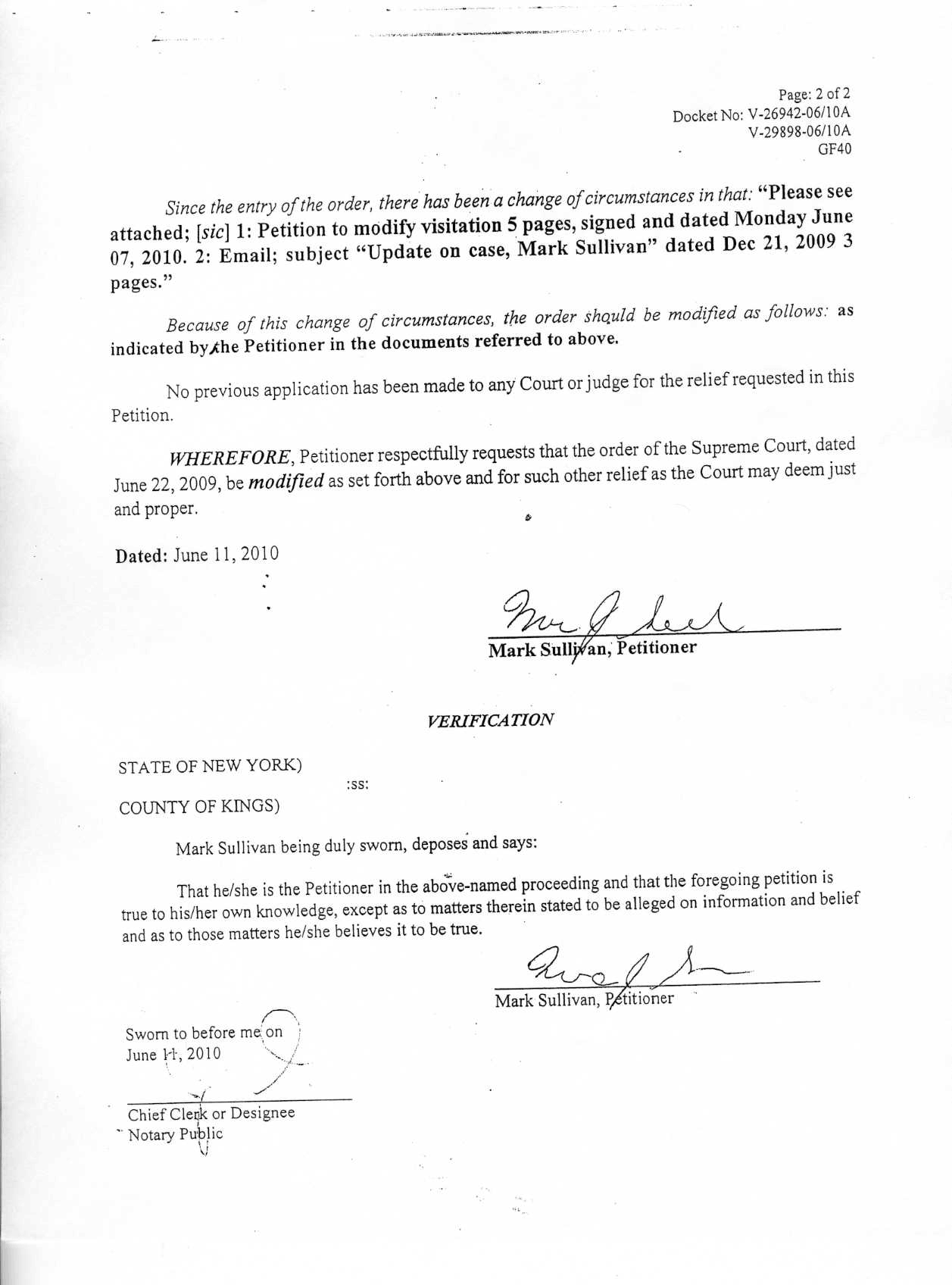
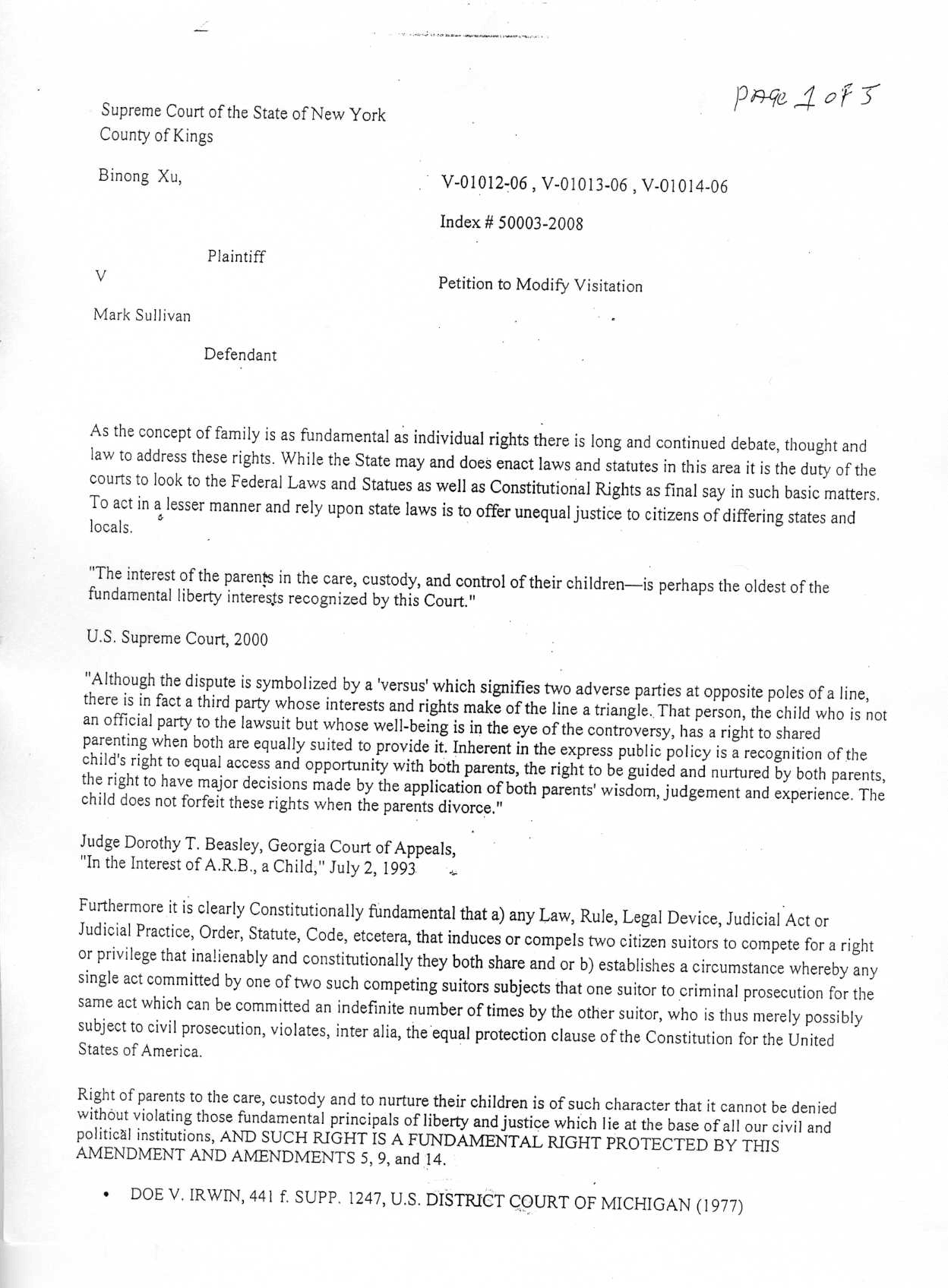
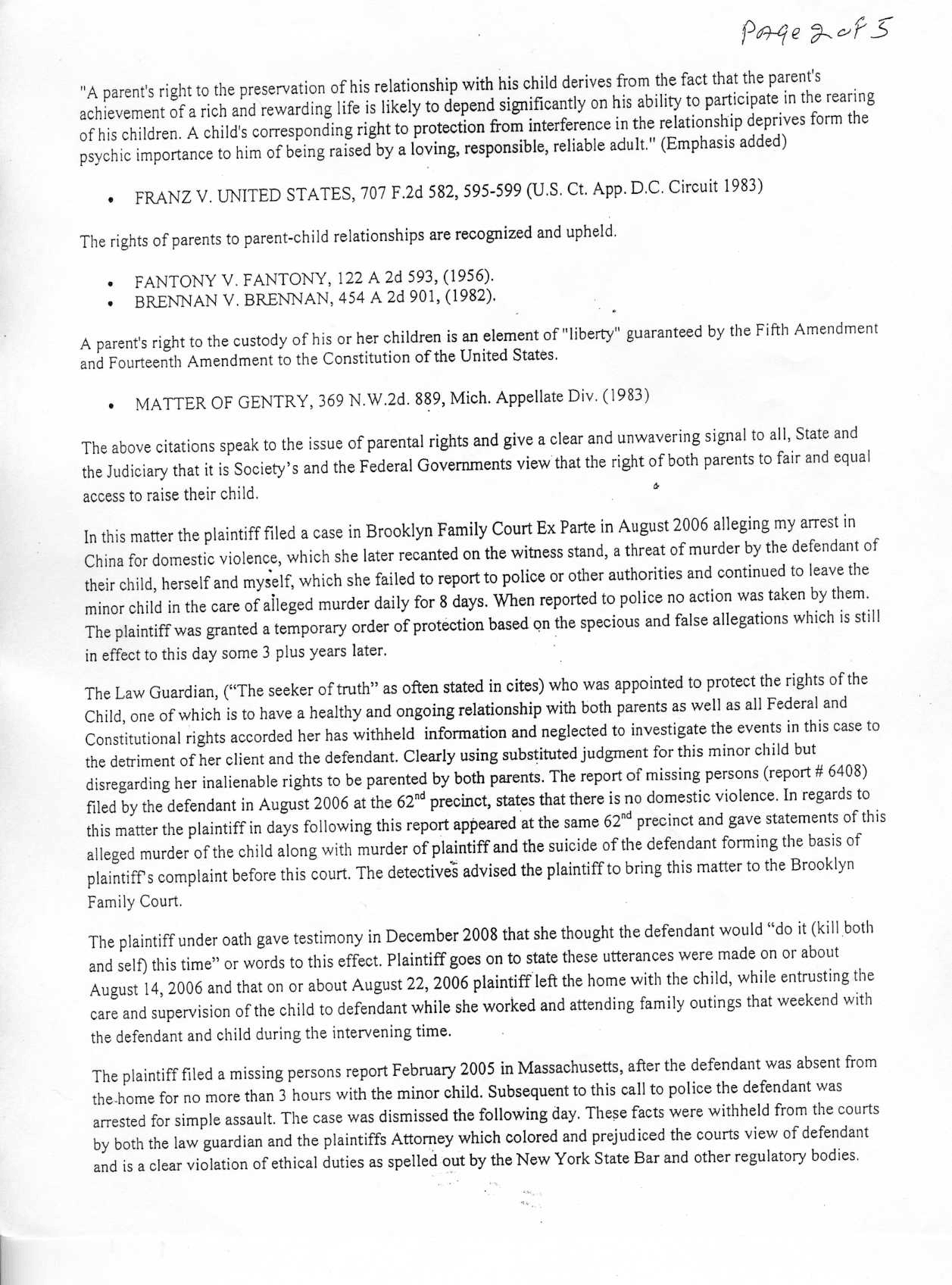
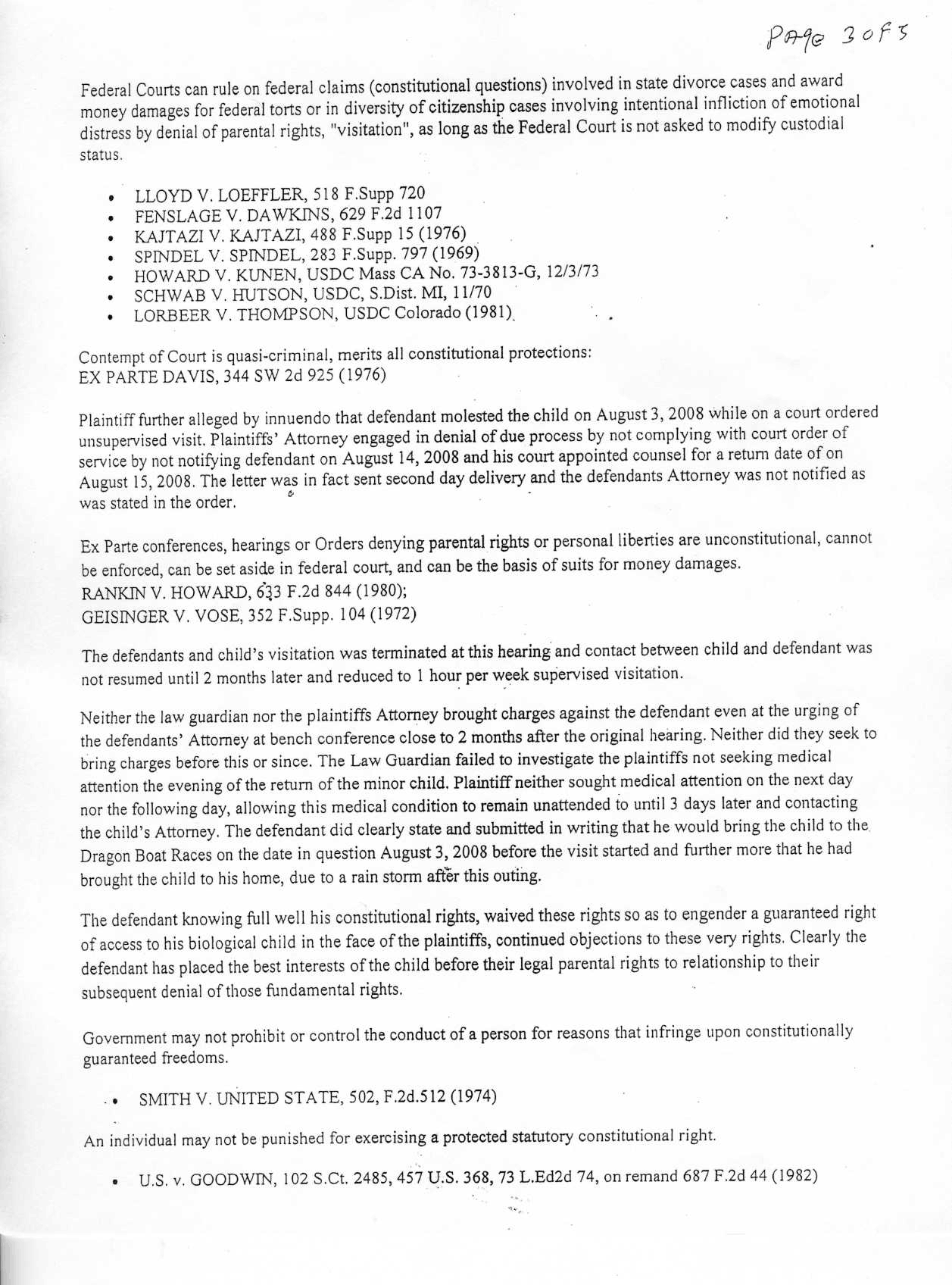
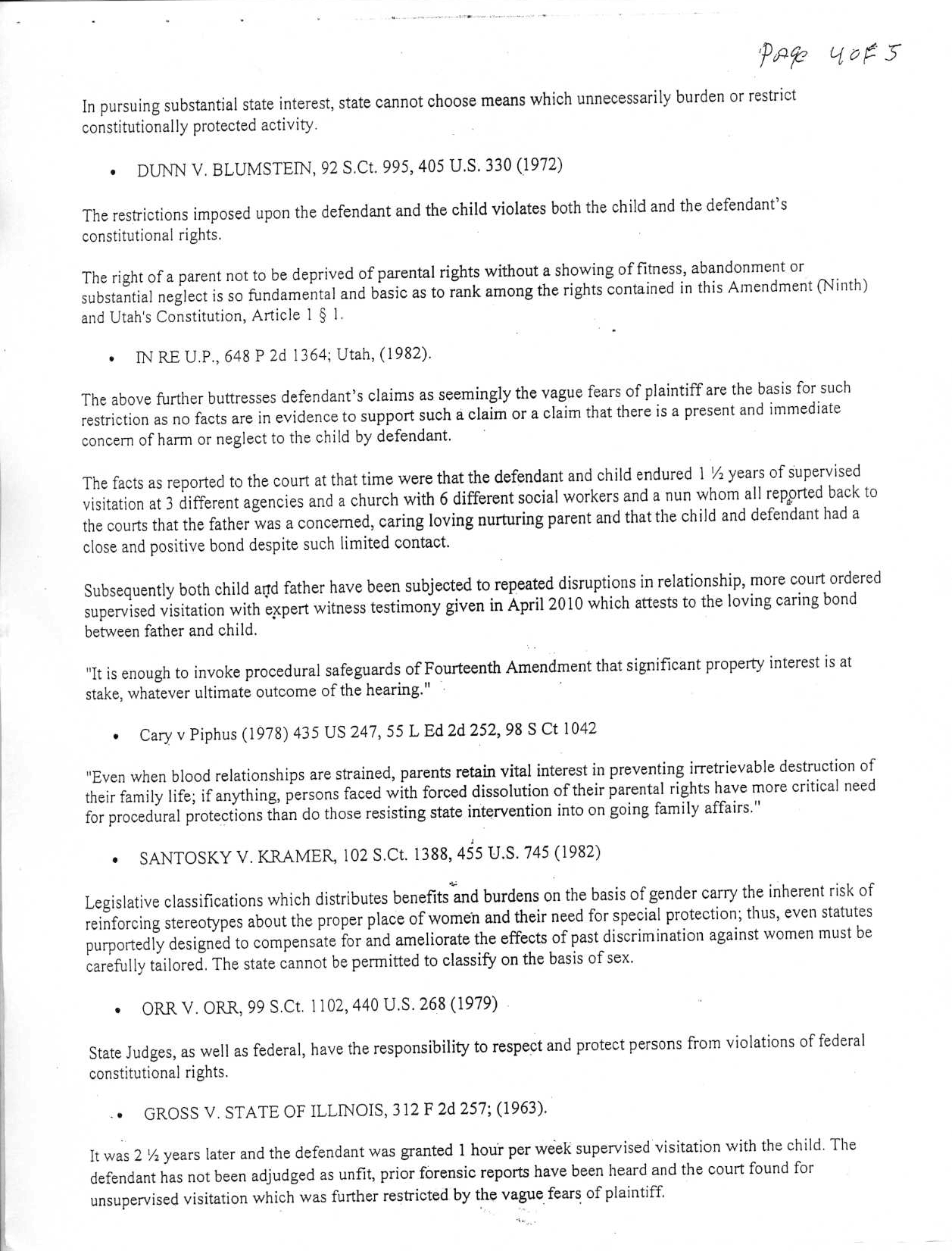
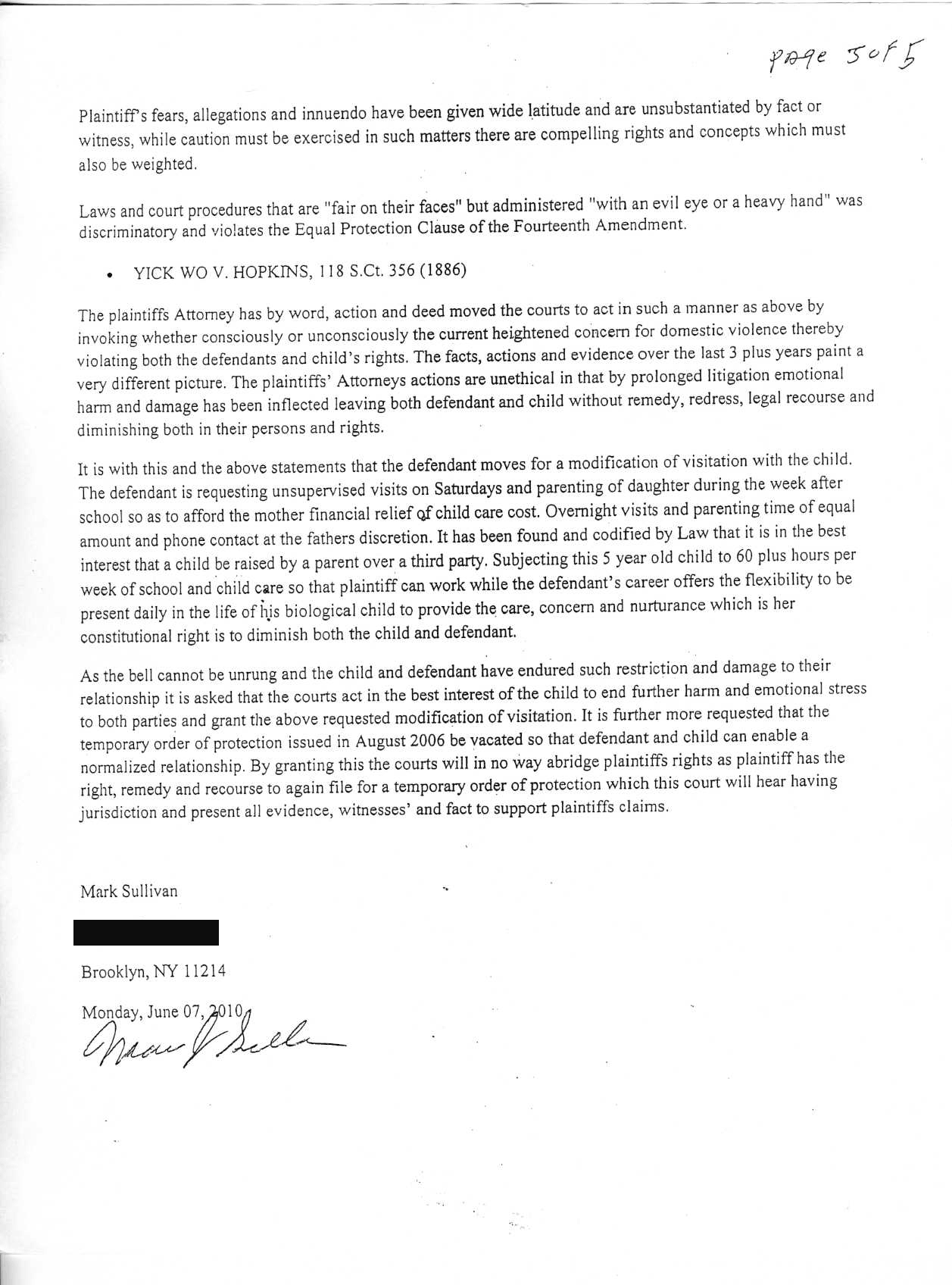
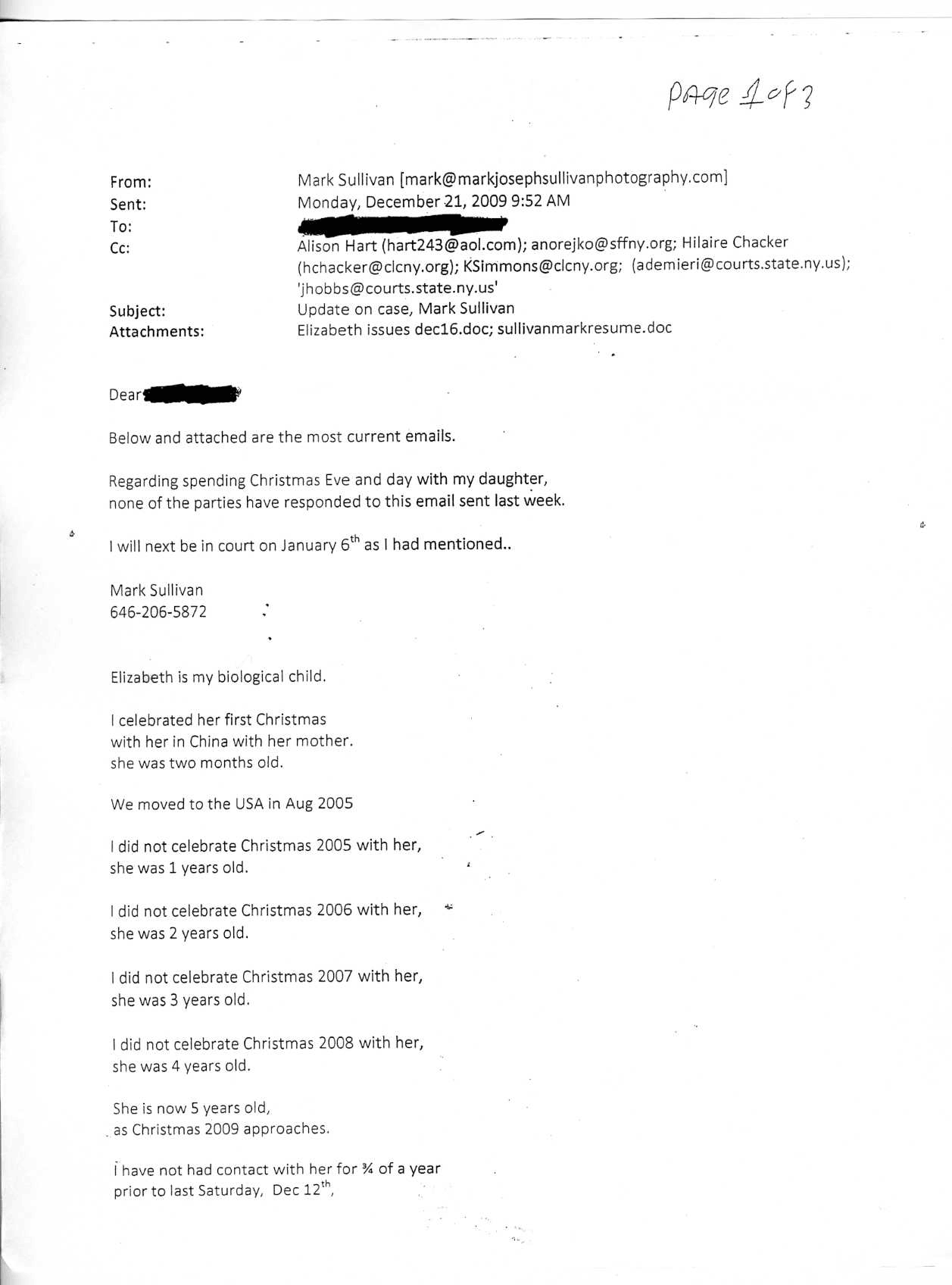
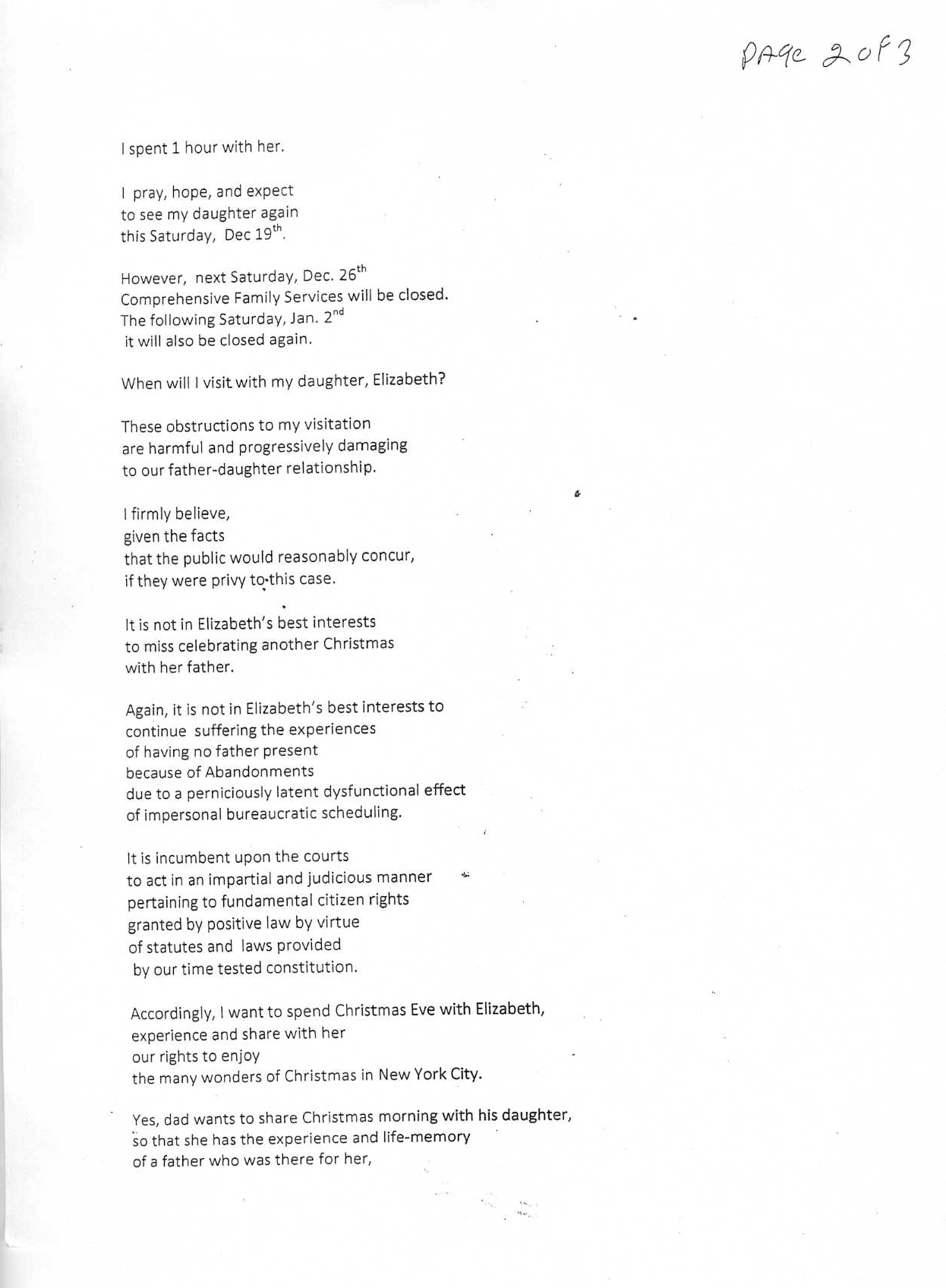
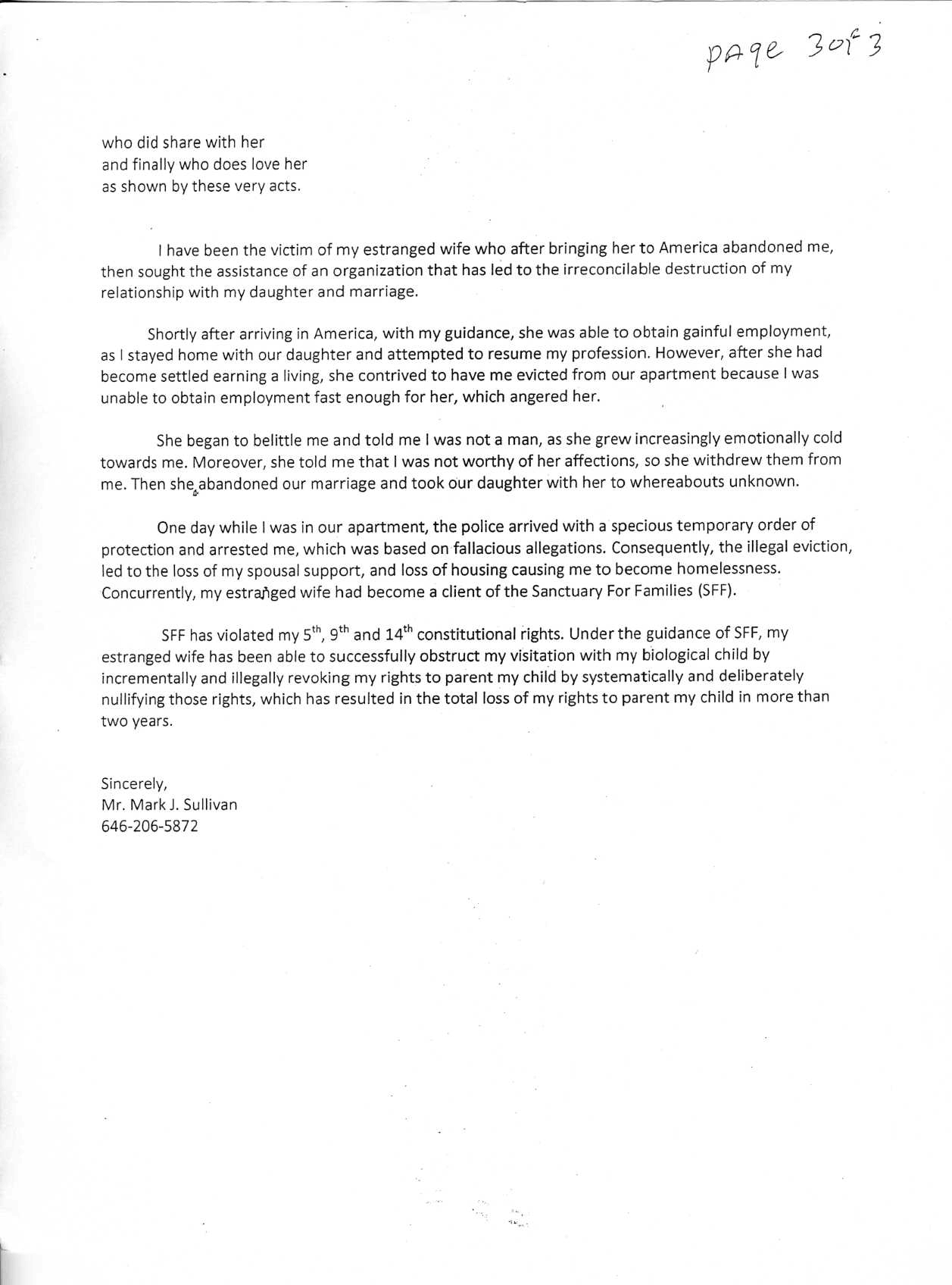
*&*
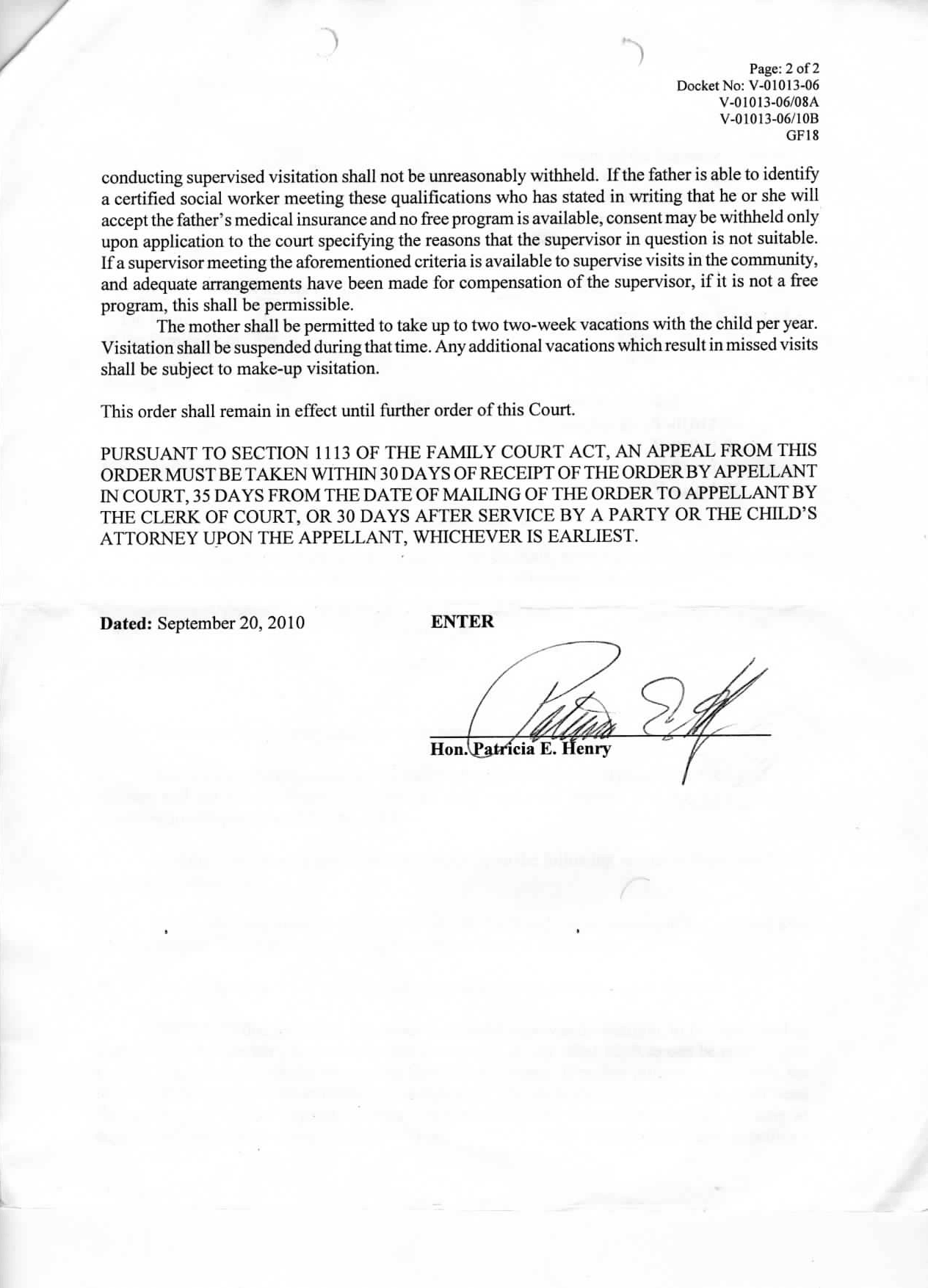
SUPREME COURT OF THE STATE OF NEW YORK
APPELLATE DIVISION: SECOND JUDICIAL DEPARTMENT
IN THE MATTER OF A PROCEEDING UNDER
ARTICLE 6 OF THE FAMILY COURT ACT
BINONG XU
Petitioner,
against
MARK SULLIVAN
Respondent
On Appeal to the Kings County IDV Court
Docket No. 2010-09212, 09214
- PRELIMINARY STATEMENT
This is an appeal of the judgment of the Kings County Supreme Court IDV Part dated September 23, 2010 which denied appellant Mark Sullivan’s petition for joint custody of his child Elizabeth and denied his petition for unsupervised visitation. For the reasons which follow the ruling on the visitation petition should be modified to grant unsupervised visitation and daily telephone contact and the matter should be remanded for a new hearing before a different judge on Mark's joint custody petition.
QUESTIONS PRESENTED
- Where the mother's claims of violence by the father were unsubstantiated and not worthy of belief, the testimony of three caseworkers who supervised visitation was that the father always behaved appropriately, the child loved him, looked forward to seeing him and was sad to leave at the end of the visits; the attorney for the child failed to express the desires of the child to the court and the court failed to inquire about them did the the court's refusal to order unsupervised visitation and telephone contact deny appellant and child their joint right to reasonable visitation, deny the father's constitutional right to due process, was it not in the best interest of the child and did it lack a sound and substantial basis in the record?
- Where the lower court did not find that the testimony of either party was entirely credible and yet relied on the testimony of the mother for its ruling denying the father's petition for joint custody even though the court made a finding that the mother contradicted herself on important issues and where appellant established that the mother's initial petition was based on allegations which the mother admitted at trial were false did the court's denial of the father's petition for joint custody lack a sound and substantial basis in the record?
STATEMENT OF FACTS
Introduction
This appeal brings up for review the cross-petitions of Mark Sullivan [hereafter Mark] and Binong Xu, [hereafter Binong] for custody of their daughter Elizabeth (born on October 21, 2004) and the final order of the IDV court that, barring further order of the court, Mark would have only supervised visitation with his daughter for the rest of her childhood and that he would have to pay for the supervision even though he had been unable to pay for it during proceedings.
The case was initiated in Family Court but was transferred to IDV Court when Binong made claims of violence. These resulted in criminal charges and the court resolved those charges with a plea to disorderly conduct; a conditional discharge, and a two year order of protection. Binong later also brought a petition for willful failure to pay child support. A matrimonial matter was added which is not a subject of this appeal but which impacts it as described below.
Mark contended in his petition, filed September 12, 2006, that Elizabeth’s best interest required that he be granted custody, or at least joint custody, because he had been Elizabeth’s primary caregiver since her birth and because he was better able to provide the necessary level of care. Binong also claimed to be Elizabeth's primary caregiver since birth even though she returned full-time to work a few months after Elizabeth's birth.
The court states in its Order that “on December 12, 2008, the father withdrew his petition for custody and it was dismissed with prejudice” (Order of 9/20/10 at 8). This is not quite accurate. What actually occurred was, as shown more fully below: a) the parties entered into negotiations for a settlement; b) one of the conditions for the settlement, had it gone through, was that he would withdraw his custody petition in exchange for concessions on visitation and other matters; and c) the settlement was abandoned but not until Mark was induced to state on the record that he would give up his custody petition. Thereafter he repeatedly stated on the record that he was not withdrawing his custody petition.
Throughout the proceedings Binong made accusations of domestic violence by Mark which were never substantiated by any other source. It was simply her word against his and the entire issue of whether her claims were true depended entirely on her credibility. Many of Binong’s accusations against Mark were based on what he allegedly said to her. Binong had a Mandarin interpreter throughout the proceedings based on her representation that she was not fluent in English yet she testified that he made specific detailed threats to her in English which she claimed to understand clearly enough to testify as to their accuracy (G. 27-30) Her ability to understand English was obviously an impediment to the trustworthiness of Binong's testimony and the court's reliance on her translation of what Mark said to her in English was misplaced.
Notably, as described below, the lower court found that Binong was not completely credible yet the court based its ruling on Binong's illogical and unsubstantiated claims of violence which Mark vehemently denied. Specifically, Binong made claims for litigation purposes that he repeatedly choked her and threatened to kill for more than two years while they lived in China but admitted that she never sought any intervention from any authority or even from her family. According to Binong she was afraid to go to the police in China because it was socially improper and first contacted the authorities when she reached the U.S. and secured a visa approximately two years after they were married.
In fact, Binong’s initial petition was based on a false statement which she later admitted was untrue and everything that followed was a result of that lie. She stated in her petition, sworn to under oath, that:
[Petitioner] states that [Respondent] choked her several times. He did this while she was pregnant. [Petitioner] states that in 2005, [Respondent] grabbed her by her hair and slammed her against the wall. [Respondent] was arrested.
In other words, she stated that Mark choked her when she was pregnant and that he was arrested for it. But, as Binong later admitted at trial, it was not true that Mark was arrested as a result of an attack while she was pregnant. The court’s order asserts that this was not a lie on Binong's part but merely a clerical error by court personnel. The record proves otherwise.
After she admitted this was not true Mark requested that the court dismiss Binong’s petition because it was based on a false statement. These false statements were the basis for the court’s issuance of the initial order of protection in Binong’s favor on August 23, 2006 and its initial order that visitation must be supervised – both of which remained in effect for years thereafter and essentially to this day. He contended that the entire action was based on a lie from its inception but Judge Henry simply disregarded Binong's false statement.
Binong made outrageous and unsubstantiated claims throughout the proceedings that Mark: threatened to kill her; hit her; choked her when she was pregnant; grabbed her by the hair and slammed her against a wall, ripped her clothes off, threw objects at her and threatened to kill himself, Binong and Elizabeth. She also testified that she never once sought help from the police or even from her own family for the entire 2 ½ years they lived together in China because she was too embarrassed and they probably wouldn’t have done anything anyway. Mark vehemently denied these outrageous and false claims. He did admit that he was a “yeller” and had thrown things on a few occasions when he got angry -- but not at anyone -- just to express his frustration.
As Mark contended at trial, the reason for Binong's false claims was simple -- she made them up to get rid of Mark once she attained what had been her goal from from the outset, obtaining legal resident status in the United States. It should have been obvious to the court that this was what the action was all about and the reason why she made her outrageous and untrue claims. Unfortunately the court did not recognize that this was the motive for her claims of domestic violence because, as happens all too often in IDV court, Mark was presumed guilty until proven innocent.
Procedural History
Pre-trial Proceedings
At the first appearance in IDV Court Judge Henry entered an order of supervised visitation which was initially supervised by a free program called Safe Horizon. Mark could not pay for supervised visitation because he was homeless and living in a shelter throughout most of the proceedings and due to his difficulties in finding work. After six months Safe Horizon no longer offered him free visitation and then NYSPCC did so for a six months until that program also ran out.
On June 25, 2007 the court modified the visitation order so that any mutually agreed upon adult could supervise the visitation and the parties agreed that a nun would supervise. Mark then made a motion for unsupervised visitation pendente lite. The court conducted a hearing on it and heard testimony from forensic evaluator Mark Rand PhD. and from the supervisor from NYSPCC who observed visits with Elizabeth. The parties consented to a temporary order of unsupervised visitation with conditions, one of which was that Mark could not take Elizabeth out of Manhattan, and that he provide a written itinerary.
In August 2008 Mark did provide an itinerary, advised the supervisor that he was taking Elizabeth to a Chinese “dragon boat festival” and the supervisor advised Binong of this. Binong knew the Chinese festival was not in Manhattan but did not object. At the festival Elizabeth scraped her knee; Mark took her to his home to wash the scrape and, since she had gotten dirty when she fell, he gave her a bath. Thereafter, seizing every opportunity to make her outrageous and false claims of abuse Binong accused Mark of sexual misconduct because he gave his daughter a bath.
Taking Elizabeth to his home was a minor infraction of the terms of supervision but Binong moved by order to show cause to suspend Mark's unsupervised visits. Mark did not receive the mailed notice until three days after the hearing, could not appear, the court conducted a hearing without him or his attorney and then summarily terminated his unsupervised visitation without giving him an opportunity to tell his side of the story. Thereafter, Mark never again had unsupervised visitation with his child even to this day. Notably, more than two years after the court made that unfair ruling the court specifically stated in its final order that it did not find that Mark ever acted in a sexually inappropriate way toward his daughter.
During the pendency of the action Binong also filed two petitions for alleged minor violations of the order of protection which were clearly made for litigation purposes. She asserted that Mark: a) called and emailed her in violation of the order of protection; and b) that “the father called the mother and left a voicemail” (Order of 9/20/10 at 8). None of these communications were threatening in any way and were obviously petty transgressions but the petitioner’s counsel and counsel for the child treated them as though they were capital offenses throughout the proceedings.
On advice of counsel Mark exercised his Fifth Amendment privilege in relation to questions about the criminal charges during his testimony at the custody and visitation hearing. Thereafter the attorney for the child acted as though she were a prosecutor for Mark's alleged crimes while never once presenting to the court how Elizabeth felt about things or whether she wanted unsupervised visitation with her father. The court similarly never inquired as to what Elizabeth wanted and her wishes were never considered even though she was a very bright six-year-old when the court issued its judgment.
In addition Binong filed a contempt motion based upon Mark's alleged failure to comply with a pendente lite order of child support entered in the matrimonial proceeding. The reality was that Mark was not able to pay child support because he was living in a shelter during most of the proceedings and had not worked steadily for several years.
On June 11, 2010 Mark, while represented by court-appointed counsel, filed a pro se petition for modification of the pendente lite order of visitation, raising constitutional and other federal law claims. He also accused the attorney for the child with acting in derogation of her duties and the mother with fabricating allegations. That petition was adopted by Mark's counsel insofar as it sought unsupervised visitation and the court specifically stated that it ruled on that petition in its opinion in this case. Accordingly, since the lower court considered those constitutional and federal law claims they have been preserved for appellate review.
The trial in this matter began on December 10, 2008 and finally concluded 2 ½ years later on July 13, 2010. The parties each testified; Mark Rand, PhD., the court-appointed psychologist who conducted the court appointed forensic evaluation testified and the court heard the testimony of the MSW caseworkers who supervised visitation between Mark and Elizabeth: a) Xuan Tran-Walsh, of NYSPCC: b) Chris Hudson, the Assistant Director of CFS, who was qualified as an expert in social work and; c) Jacqueline McGowan, also of CFS. In addition, the court considered the forensic evaluation report dated October 15, 2007, prepared by Dr. Rand and e-mails from the father to his attorney which copied his own attorney, other counsel, the court and members of the press.
The court stated in its opinion that Binong’s testimony was somewhat credible but that there were some issues on which she was not credible. For example, the court found that Binong was not credible when she testified about becoming pregnant (Order at 14) noting that Binong first testified that Mark “put pressure on her to have an abortion” and that “this is inconsistent with her claim that the father should have accepted financial responsibility for the child since it was he who had wanted a child” (Order at 14 [emphasis supplied]). In other words, she first testified that Mark didn’t want the baby and later testified that he was the one who wanted the baby. This was typical of Binong’s testimony -- she would say anything to portray herself as a victim of Mark's abuse even if it had no basis whatsoever in fact. Fortunately the court recognized that she was not always credible.
The court did not specifically state in its opinion that Mark’s testimony was not credible, merely that it contained “inconsistencies” and that he was “evasive” (See Order of 9/20/10 at 10). The court also credited the testimony of the caseworkers who observed the visitation which was very favorable to Mark.
As described more fully below, the trial testimony described the following. Mark and Binong met over the internet in 2001 when she was living in China and he in the U.S.. Binong was still married when they began to communicate but she contacted Mark nearly every day for a year and eventually convinced him to visit her in China in October 2002 for three weeks to discuss the possibility of marriage. Binong had been married for six years to a Chinese man but abruptly sought and obtained a divorce about a month after Mark agreed to marry her. When Mark came to China to visit Binong, seeing an opportunity to become a legal U.S. resident, Binong had sex with him and convinced him to marry her. She quickly got a divorce in November 2002 and married Mark about a month later in December 2002. The reason for this became apparent during trial where it was disclosed that, for the same kind of work she made about $6,000 a year in China but made about $60,000 a year in the U.S..
As soon as they were married Binong began to pressure Mark to obtain a visa for her so she could leave China for the United States. Originally they hoped it would take six to nine months but the process was repeatedly delayed and eventually took 2 ½ years, until August 2005. During that time they had to remain in China and Mark, not being a citizen, was not legally permitted to work. This adversely affected his career as a photographer. Binong claimed he made no efforts to obtain work in China but had to admit that he could not legally work there.
As a result Mark became the primary caretaker for Elizabeth for most of the first two years of her life while Binong worked full-time and furthered her career both in China and the U.S.. The court characterized this as a failure on Mark’s part (see Order at 13-14) even though it would have been illegal for him to work in China. Moreover, if he had been a woman it would have been perfectly natural for him to stay home with his child while the other spouse worked but the court repeatedly criticized Mark for being a stay-at-home dad and applied this double-standard throughout the proceedings.
During 2005, anxious to become a U.S. citizen, Binong traveled to the U.S. with Elizabeth when she was three months old to validate her visa. She left Mark behind in China because they did not have sufficient funds for all three to travel and he was not able to come to the U.S. for another month. Mark followed later when he obtained the necessary funds and while on that visit they resided at Mark’s sister’s home in Springfield, Massachusetts. During that trip Binong had Mark arrested because he went for a walk with Elizabeth for three or four hours after an argument without telling her where he was going. Eventually those charges were dismissed as being without basis.
They returned to China in February 2005; moved to the U.S. permanently in August 2005 and again resided with Mark’s sister in Springfield. Not having worked for 2 ½ years in China and being in his fifties Mark could not find work in the U.S.. He was also hampered by the fact that the photography industry had changed rapidly from film to digital media. They agreed that since Binong had more marketable skills Mark would be Elizabeth’s caregiver and because he would also be able to receive public assistance for himself and Elizabeth while Binong could not because she was only a conditional U.S. Resident. On December 10, 2005 Binong took Elizabeth and left Mark; lived in Massachusetts for a while and then moved to New York City. Binong was able to get public assistance in New York after she claimed that she was a victim of domestic violence but she had not been able to secure such assistance in Massachusetts.
They stayed in touch and reunited shortly thereafter; got housing assistance and secured an apartment in New York in April 2006 but shortly after securing the apartment with her name on the lease Binong again took Elizabeth and left Mark for good in August 2006. Making claims of domestic violence by Mark she filed a family offense petition on August 23, 2006 which initiated this action. This effectively got rid of Mark because she easily obtained an order of protection which required that Mark, who had no place to go, vacate their apartment. When Mark objected to leaving Binong had him arrested, again based on accusations of domestic violence.
As a result he was charged with a family offense and on December 13, 2006, on the advice of counsel, admitted to the violation of disorderly conduct. The court imposed a conditional discharge and a two year order of protection. He was subsequently charged with a violation of that order based on allegations that he sent Binong two non-threatening e-mails and left her a non-threatening voice message. The first e-mail merely stated how much he loved Binong and Elizabeth and asked her to consider reconciliation. In the second e-mail he merely asks Binong to voluntarily meet with him and discuss reconciliation.
Binong also accused him during trial of trying to obtain her address by giving Elizabeth the address of his website. The court found that Binong had no basis for this concern and stated “the court is not persuaded that this was the father’s purpose in providing this information” (Order at 28) and “the court does not find that the father’s intent in providing his website information was anything other than to share family photographs on his website” (Order at 28).
The event which led to the court terminating Mark’s unsupervised visitation was his decision to take Elizabeth to a Chinese “Dragon Boat Festival” in Queens. He provided the visitation supervisor with an itinerary, as required, which stated he was taking her to the festival but did not specifically state that it was in Queens. Binong was aware that he was taking her there and knew where it was. Elizabeth scraped her knee at the festival; he took her back to his apartment to wash the scrape and wound up giving his daughter a bath. Upon learning of this Binong seized the opportunity to make wild accusations of sexual misconduct with no basis whatsoever. She sought and obtained an order to show cause and an immediate hearing on termination of unsupervised visitation. Rather than ensure that Mark had an opportunity to defend himself the court permitted Binong’s counsel to mail the order to show cause for over-night delivery the next day for a hearing the day after that. Specifically the order to show cause to suspend visits issued on August 13, 2008 for a hearing to occur on August 15, 2008 provided that service “upon Respondent by overnight express mail and by personal service upon Counsel for Respondent . . . on or before August 14, 2008 [would] be deemed good and sufficient service” (Order to Show Cause at 1). Mark did not receive it until three days after the hearing and when neither Mark nor his attorney appeared the court impermissibly conducted an ex parte hearing rather than adjourning so that Mark and his counsel could defend against the charges and then terminated his unsupervised visitation with his daughter.
As the court later ruled in its Order, Binong's claims of sexual misconduct and mistreatment had no basis but Mark was denied his right to confront the charges against him. Notably, the court stated in its Order, two years after his unsupervised visits were terminated, “the court makes no finding that the father sexually abused the child or in any way mistreated her during the visit in question” (Order at 30). Had the court protected Mark’s due process right to defend himself rather than permitting an ex parte hearing the court could have reached that conclusion two years earlier and Mark’s right to unsupervised visitation with his daughter would not have been summarily terminated. If the court had acted impartially rather than assuming that Binong’s claims of domestic violence were true it would have been clear that there was no basis for requiring supervision. The three caseworkers who supervised the visits over three years, who all had masters degrees in social work, testified that Mark did nothing to suggest that visitation had to be supervised. Indeed, according to the court itself:
- “All three supervisors testified that the father and child had a warm relationship, the father’s interaction with the child was appropriate and that they did not have to intervene during the sessions. The supervisors would have intervened if any condition of visitation had been violated” (Order at 30);
- Commenting on Binong’s accusation that during a visit Mark gave Elizabeth candy which she called “poisoned” but which had actually only been recalled the court stated, “although the recall was highly publicized and counsel for the mother tried to suggest that the father’s lack of awareness of this was negligent, the court notes that the visitation supervisor was also apparently unaware that that particular candy had been recalled” (Order at 32);
The court also noted that:
Chris Hudson and Jackie McGowan . . . characterized the visits as having gone well, and not requiring any intervention. The father was consistently appropriate and engaged well with the child. The child was comfortable with the father and demonstrated affection spontaneously. She sometimes appeared sad for the visit to end, although she was always happy to be reunited with the mother. The father . . . was appropriate in the sense that he was careful not to create false expectations
(Order at 34).
The Trial
Trial began on December 11, 2008 (Tr. A) with the testimony of Petitioner BINONG XU who, in addition to the facts described above, testified that after she became pregnant, they were discussing Mark's employment and she said to him “you’re the one who wanted the kid so you should be responsible for the kid” (A. 103). As Judge Henry later noted in her Order, Binong then contradicted this statement almost immediately and claimed, two pages later in the transcript, that Mark didn’t “want the kid” and instead wanted her to get an abortion. When asked “what was Mr. Sullivan’s reaction when he found out you were pregnant?” Binong said. “he was very upset. He told me why don’t you go get an abortion” (A. 105). This obvious contradiction shows that she was making up her testimony as she went along and said anything she could think of to make Mark look bad. Being caught red-handed in a lie like this should have destroyed her credibility in the eyes of Judge Henry but the court disregarded it and relied on her testimony that Mark abused her for her ruling.
At the appearance on December 12, 2008 (Tr. B) Mark asked if he could address the court regarding a possible settlement (B. 129). Notably, the court had required on the related matrimonial action that Mark represent himself or hire a lawyer (which he could not do) and so Mark had been addressing the court all along in the matrimonial action as his own counsel. However, when he tried to address the court in the obviously related custody action the court did not permit him to ask about it stating “settlement discussions are not part of the record . . . I’ve encouraged counsel to engage in discussions . . . and I see no basis to give you an opportunity to make a statement in the middle of trial” (B. 129-30). Mark said, “it’s not a statement. I may not have heard you . . . I thought your Honor would need to understand the most recent permutations” (B. 130). The court refused to hear what he had to say and continued the examination of Binong.
Binong then testified that:
- when asked what Mark said when he called her on the phone (which was allegedly a violation of the order of protection) she stated “he said that to forgive him. He wanted to get back together with me, want to start a new life and want me to seek family counseling for help” (B. 157). The e-mail which supposedly violated the order of protection was merely a request for Binong to voluntarily meet him at Barnes and Noble with Elizabeth (B. 158).
- Despite the innocent nature of these communications Binong claimed she was “very shocked” to receive them and that she had no option but to report them to the police and have him prosecuted (B. 160).
Following this testimony Mark’s counsel addressed the court on the settlement issue about which Mark had wanted to address the court - - the provision in the settlement that he withdraw his custody petition (B. 172-73). Counsel stated “on instructions from my client, we are going to withdraw at this time the custody petition” (B. 172). Unable to discuss it with the court and ensure that the rest of the settlement would be honored if he did so Mark stated he agreed with what his lawyer was doing (B. 172-73). Without giving Mark a chance to express his concerns the court said, “then Docket V01014 of ‘06, that petition is withdrawn and dismissed with prejudice” (B. 173).
At the appearance on December 10, 2008 (Tr. C) psychologist MARK RAND was qualified as an expert in family and forensic psychology and testified that his views were drawn from discussions with Binong in which “she reported a long history of being abused and controlled by [Mark]” (C. 22). He took her word for it. Mark never admitted to the hitting or choking Binong accused him of, but he admitted that he yelled and that he threw things on two occasions – although did not hit anyone or intend to hit anyone. He also admitted that he used “nasty words” and curse words on some occasions and it was wrong to do so).
On April 22, 2009 (Tr. D) the court stated they were there on Binong’s “petition for custody and her petition for an order of protection” (D. 3). Attorney Alan Rosenberg, who had withdrawn his client’s custody petition as part of the settlement which did not go through, noted that “Mr. Sullivan had filed for custody”. Binong’s counsel, taking unfair advantage of the failed settlement talks to which she was a party objected that Mark had withdrawn his custody petition (D. 3). The court said “he did indicate on the record that he was not seeking custody” and Mark’s counsel said, “that was in the context of settlement negotiations that eventually broke down”
and that counsel spent most of the third day of trial “mostly talking about a settlement that did not work out” (D. 4). It was in that context “that we were talking about withdrawal” (D. 5). Even though she knew that giving up his custody petition was part of the settlement that never went through Binong’s counsel said, “we object to restoring that custody petition”. The court said, “I am going to permit it” but Binong’s counsel continued to object (D. 5-6) and based on her arguments Judge Henry changed her mind and said, “for clarification I am going to restore Docket V01014 of ’06 as to visitation only” (D. 7).
On April 30, 2009 (Tr. E) Mark Rand’s testimony continued and he stated inter alia that:
- he did his forensic evaluation and report on October 15, 2007, approximately 18 months months before he testified and did not have access to any “recent reports” which could have an effect on changing his opinion (E. 13);
- Mark admitted to him that he was “a yeller” and that it wasn’t right to yell (E. 30-31);
- Elizabeth “enjoyed time with her father and I saw that positive strength on the part of the father” (E. 34).
On May 18, 2009 (Tr. F) Binong continued her testimony which had been adjourned so that Mark Rand could testify. She stated that:
- one time during the supervised visit, “the father gave some sort of poisoned milk” to Elizabeth (F. 4) and she knew it was “poisoned” because “it was broadcasted in newspaper, on TV” that it “has poison in it” (F. 5). (This was the candy which was recalled and the court later made a finding that Mark did not know it was recalled). Binong, as usual, portrayed Mark in the worst light possible by claiming three times that the candy he gave her was “poisoned” as though he would deliberately poison his own daughter;
- she made claims that on several occasions Mark choked her but admitted she did not see a doctor when she received the “injuries to [her] neck” that “prevented [her] from breathing” because she “did not have medical insurance” (F. 27);
- she claimed he threatened to have her deported but she admitted he took no action to do so (F. 36).
On October 19, 2009 (Tr. G) the court noted that it relieved Attorney Rosenberg at his request and assigned Allison Hart to represent Mark. Ms. Hart requested a mistrial and the court denied the motion (G. 2-3). Binong continued testifying and stated:
- when she lived in China she was making under $10,000 a year, she contacted Mark over the internet when she learned he was a U.S. citizen and was employed (G. 17-20). Their internet discussions led to a plan to settle down in the United States (G. 15). They became romantically involved, agreed that he would come to China to live with her at her apartment and admitted she was still married when she agreed to this (G. 23);
- Mark arrived and stayed with her in September 2002 and they became “intimate” even though she was still married (G. 24). She had been married for about six years at that point (G. 24);
- when she married Mark in December 2002 she was 39 years old. Elizabeth was born nearly two years after Mark came to live in China - - on October 21, 2004 (G. 48);
- Binong had a Mandarin interpreter throughout the proceedings based on her representation that she was not fluent in English. She testified that he made specific detailed threats to her in English which she claimed to understand clearly enough to testify as to their accuracy (G. 27-30);
- At one point when Elizabeth was one and a half, teething and “crying continually” Mark gave her liquid “Tylenol and Ibuprophen” which was an over-the-counter pain medication. Binong objected and threw away the medicine (G. 51-52). Even though she was “crying continually” Binong “did not think my child would need to take medication” (G. 52).
- It took Binong until August 2006 to obtain permanent resident status, public assistance and publicly funded housing assistance with her name on the lease (G. 60-61) and when she did she left Mark, taking Elizabeth with her (G. 61). She made claims of domestic violence against Mark, which enabled her to get a temporary order of protection and get him evicted from their apartment (G. 61). (This explains why she waited until then to have Mark arrested and evicted -- until she obtained permanent resident status it was helpful to be married to a U.S. citizen who was the father of her child). After she became a permanent resident and secured public assistance and housing assistance she got an order of protection based on domestic violence claims and returned to the apartment with two officers who evicted Mark from his home and arrested him when he objected (id.).
On October 20, 2009 (Tr. H) Binong continued her testimony and stated that:
- In China the police do not do anything about a domestic violence and a man could beat his wife whenever he wanted and be sure that he would not be arrested (H. 89). She claimed that if a woman tried to tell anyone that she was being beaten by her husband “[p]eople would only laugh at you” (H. 92);
- She also claimed that her parents would not have done anything to help her if she told them she was being beaten or choked while she was pregnant (H. 104).
On October 27, 2009 (Tr. I) visitation supervisor Xuan Tran Walsh testified that:
- She supervised Mark’s weekly visitation from September 2008 to March 2009 and never had to intervene once due to improper activity by Mark (I. 15). Elizabeth never hesitated when going to Mark; she engaged and played with him and he reciprocated (I. 15). She showed physical affection; hugged and kissed him (I. 15) and all the visits were “appropriate” and “loving” (I. 15-16). She would say “I love you Daddy” and he would say “I love you Elizabeth” (I. 16);
- The agency asked that Mark complete a parenting skills course and he did so (I. 21-22). She told Mark on one occasion that the Chinese white rabbit candies he brought Elizabeth had been recalled and he said he was not aware of that (I. 22). Ms. Tran-Walsh was not aware of it either - - it was Binong who told her they were recalled (I. 22).
MARK SULLIVAN's testimony began on October 28, 2009 (Tr. J) and he stated that:
- He was fifty three years old, obtained a Bachelor of Arts from Rochester Institute of Technology (RIT) and he had always made his living since 1991 as a freelance photographer (J. 3). He had suffered financial setbacks as a result of the 2 ½ years he spent in China trying to get a visa for Binong during which he could not work. At that point he was working “per diem” at 10 dollars per hour as a temp (J. 3-4) but had lived in shelters throughout most of the proceedings. He had worked the week before but not that week and his income was spotty (J., 4-5). He was living in a shelter at the time of his testimony (J. 6) although by the time the court issued its final order he had his own apartment;
- He met Binong on the internet in July 2001. It was Binong who first contacted him (J. 6). They communicated on the internet for about a year and a half then spoke on the phone just before he traveled to China (J. 6). She agreed to a visit in which he would live with her (J. 6). Mark was making a living as a freelance photographer at that point and put his career on hold to travel to China to meet her (J. 8);
- After he arrived their relationship became “intimate”, she became his “girlfriend” and stayed in the apartment which she owned with her husband, to whom she was still married (J. 9). He never spoke Chinese, and could not even say “hello” in that language (J. 10). He had obtained a visa to go to China for three weeks to meet Binong and he took a sabbatical from his job to do so (J. 10). During that three week visit they became “engaged to be married” (J. 11). Before returning to China, from October to November 2002, he worked in the United States on getting Binong a visa so she could move to the United States (J. 6), made a visit to his Congressman’s office to arrange this and collected and submitted necessary paperwork (J. 13). The sole purpose of returning to the United States after they became engaged was so that he could work on obtaining her visa (J. 13-14). The plan was to marry in China and then return to the United States to reside (J. 14).
- Mark returned about a month later in early November 2002; they were married on December 12, 2002 and lived in China thereafter for 2 ½ years trying to obtain a “permanent resident” visa for Binong (J. 15). The Congressman’s office told him it would take about nine months to get CR-1 “Conditional Resident” status and a K-3 visa (J. 16). The conditional resident status that came with her visa was “good for three years ” (J. 17) and it was dependent on them remaining married (J. 17);
- She was making about $6,000 a year at that time but Mark could not work without a “work permit.” Binong knew this all along and she was “ok with that” (J. 19-20);
- They planned on having a child and when he learned she was pregnant he was “very happy” and so was Binong (J. 29).
On January 6, 2010 (Tr. K) Mark continued his testimony and stated that:
- When he “first met” Binong they immediately had discussions about relocating to America (K. 10). His “main focus” while they lived in China was “to obtain a visa” for her (K. 11);
- When Binong finally got her visa during the three week trip to the U.S. it was only a two year visa, not the ten year one Binong had expected, and she was very irate about this (K. 15-17). She became very “upset, angry, withdrawn” (K. 25). One day when they were arguing he told her I’m going to take Elizabeth for a walk because “it would be an opportunity for my wife to relax” and he remained out for about four hours. She called the police on him, claiming that he absconded with Elizabeth, they were waiting for him when he returned and they arrested him (K. 25-26). The state later dismissed the case as being without basis (K. 24);
- They remained in America three weeks, Binong still only had a conditional CR-1 visa and they returned to China to wait for Binong's permanent resident visa. Binong resumed working full-time and Mark became Elizabeth’s primary caretaker. He fed her, clothed her, changed her diapers and did the cooking and cleaning (K. 29). He kept working on her visa and eventually she got the ten year visa which enabled them to move to the United States (K. 30);
- They moved to America for good in August 2005, gave up the lease in China and Binong resigned from her job (K. 30). At that point Binong was not working yet, but Mark was able to obtain public assistance and publicly funded medical care for himself and Elizabeth (K. 40-41);
- Once they moved to the United States for good and Binong got permanent resident status she became withdrawn and argumentative with Mark. He consulted a psychologist who recommended that she go for counseling (K. 46-47). When he mentioned this Binong became very upset and said in her culture would be considered “shaming her in public”. The day after he recommended it he woke up the next morning to find that Binong and Elizabeth were gone (K. 47). He filed a missing persons report on December 9, 2005 and then did not hear from Binong for 14 days (K. 48-49) until December 23, 2005 when he received an email from her (K. 49-50). She did not say where she was but they communicated by e-mail thereafter and then phone calls (K. 51);
- In early January 2006 she and Elizabeth met Mark in New York at the public library (K. 52). After that, by joint agreement he came down to New York on weekends to see them (K. 53) and she agreed to get back together (K. 54). Based on her status as the wife or a U.S. Citizen and mother of his child she was able to get public assistance for an apartment in Brooklyn with the lease in her name and they moved in together early April 2005 (K. 55-56). Binong was working as a temp and he resumed his role as Elizabeth’s primary caretaker (K. 55-56). It was he who found daycare for Elizabeth and who found her a pediatrician (K. 56);
- At one point when she was acting angry and depressed he said that if she was not committed to the family she should leave (K. 64-65). Shortly after that she waited until she could be alone with Elizabeth and then absconded with her (K. 65-66). It was not because of domestic violence, it was because their relationship changed when she got her permanent resident status and she was arguing with him and angry at him all the time (K. 65-66). He filed a missing persons report, the police came and took information, made an investigation and then told him to wait (K. 68-69).
- Days later a detective contacted him by phone and he could hear Binong speaking in the background (K. 70-71). Binong had made claims of domestic violence at that point but ACS conducted an investigation which concluded that neglect was not “indicated” (K. 72). After that Binong obtained an order of protection in Family Court based on claims of violence and on August 26th she came to the apartment with two officers (K. 73). They put a piece of paper on the table which turned out to be the temporary order of protection which stated Mark had to stay away from Binong (K. 74). Shortly thereafter on September 8th two officers came to his home and told him he had to vacate the apartment (K. 75). When he objected to this they placed him under arrest and escorted him out in handcuffs (K. 75). He spent the night in jail, was released temporarily and when he returned to court his attorney, who he first met just moments before, told him to accept an ACD and allocute to disorderly conduct or face a year in jail (K. 76-77), He did what his attorney told him to do;
- After Binong had him evicted from their apartment he had no place to live or any income and he became homeless (K. 78). To obtain the order of protection which forced Mark to vacate their apartment Binong had claimed, among other things, that Mark hit her in the mouth with his elbow and threatened to kill Binong and Elizabeth and himself (K. 78). She filed a custody petition based on the same claims and the case was transferred to Judge Henry in IDV Court in September (K. 79). Based solely on Binong's allegations the court denied Mark's request for unsupervised visitation with his daughter (K. 80). He was not permitted any contact other then one visit a week, strictly supervised, and could not call Elizabeth on the phone or write to her – all based entirely on Binong’s unproven claims that he had been violent (K. 85-86);
- The court later agreed to unsupervised visitation and, as described above, when he took Elizabeth to the Dragon Boat Festival and to his apartment Binong’s counsel sent him written notice for a hearing to take place on August 15th 2008 which he did not receive until August 18th (K. 98-99). On August 15th Mark got a call from his attorney who said the visits had been terminated (K. 99) and he learned that his attorney had also not been present at that hearing (K. 101);
- Binong was able to get on public assistance in New York because she had permanent resident status and claimed to be a victim of domestic violence but had not been able to get it in Massachusetts (K. 218). When Binong finally got rid of Mark it was after she obtained an apartment in her name through public assistance and she and Elizabeth were both receiving public assistance (K. 218) so she no longer needed Mark at that point.
On March 9, 2010 (Tr. L) Mark continued his testimony and stated:
- In August 2006 Binong made a sworn statement that Mark was arrested in China in her original “allegations that started this case”; this was perjury and so the whole case was based on perjury (L. 56). Mark pointed out that during her testimony Binong admitted that this allegation in the petition was untrue when she testified that he was never arrested in China (L. 57). Mark added that “perjury and false allegations have tied me up in court for the last three and a half years” and it all started with her original false statements in her petition (L. 57).
At the conclusion of that appearance Mark’s counsel requested that the court grant unsupervised visitation based on a report from the visitation supervisor that “the visits are extremely successful” and because Mark had recently been able to secure employment; had a residence and was no longer in a shelter (L. 95). The court denied the motion without stating any basis (L. 97).
On March 7, 2010 (Tr. M) Mark testified that:
- It was unfair that Binong had him arrested the day he took Elizabeth out for 3 or 4 hours in Springfield because all he did was take her out for a while without telling Binong and she’d done that many times herself (M. 57). They had argued just before she had him arrested and he admitted he cursed at her; called her names and “over-reacted” but that was no reason to have him arrested (M. 59);
- In the past he supported himself as a free-lance photographer but the industry had changed drastically from film to digital; he could no longer find work and was reduced to taking temp jobs for about 10 dollars an hour (M. 62-64). The little money he made served only to keep him out of the shelter system (M 72);
- He admitted he used curse words with Binong but never when Elizabeth was in the room (M. 81). He also admitted that he told her that if she was not committed to the marriage she should pack her bags and get out (M. 82). This was in reaction to similar things she said to him like she was going to have him arrested again, like she did in Springfield.
On April 8, 2010 (Tr. N) visitation supervisor CHRIS HUDSON, MSW testified that:
- When he supervised the visits with Mark and Elizabeth she was “excited to see Mr. Sullivan and ran to him at first sight and they were affectionate” (N. 25). All of the visits he supervised went well (N. 25). They spoke about school and her activities and played games together and none of their conversations were inappropriate (id.). He never had to intercede during visits (id.);
- Elizabeth never showed any hesitation in going to her father and “appeared to be quite excited to see Mr. Sullivan at the beginning of each of the observations” (N. 29). Mark was “also very excited to see Elizabeth and interested in spending time with her (N. 30). He never felt like “Elizabeth was unsafe” during these visits (N. 30). When the visits ended Elizabeth seemed “sad to leave” and would “delay the end of the visit” (N. 37). She would hug her father and tell him she loved him (N. 37). Mr. Hudson never felt that Mark would put Elizabeth “in harm’s way” (N. 37-38);
- Although these visits went so well they had to end because Mark could not afford to pay for them (N. 39-40).
On May 6, 2010 (Tr. O) JACKIE MCGOWEN, MSW, testified that:
- she also supervised visits between Mark and Elizabeth (O. 5); both father and child were “very happy, affectionate, appropriate” during those hour long visits (O. 9); and there was never any “inappropriateness” (O. 9). She never felt like “the child was in an unsafe condition” and she never had to “intervene in the visits” (O. 9). He would take an interest in her schoolwork and there was good communication (O. 12).
On June 14, 2010 (Tr. P) the parties discussed Mark’s recently filed petition for shared parenting and Mark’s attorney adopted his petition which had been filed pro se (P. 21).
On July 12, 2010 the parties rested and the court heard summations.
The Court’s Findings and Conclusions
In its Findings and Conclusions dated September 20, 2010 the IDV court stated:
- Mark committed one or more family offenses and violated the order of protection by “communicating with the mother via e-mail.” (Order at 52). (As noted, those two non-threatening e-mails merely asked her to consider getting back together) (Order at 52);
- Based on Binong’s claims with no other proof the court made findings of violent conduct by Mark (Order at 53). Based on this the court ordered that, barring further order of the court, Mark would never again have unsupervised visitation with his only child (Order at 53). (This order virtually guaranteed no visitation at all because the court was well aware that Mark was unable to pay for the supervision and had already missed months of visitation because he was unable to pay);
- The testimony was that Binong went back to work full-time shortly after Elizabeth was born; that for most of the first two years of her life Mark stayed home with Elizabeth while Binong went to work, fed her, changed her diapers, cared for her and did the cooking and the cleaning. Nevertheless the court made a baseless finding that Binong “has been the primary caregiver of the child since birth” (Order at 54). (On the contrary, it was Mark who was Elizabeth’s “primary caregiver since birth” until Binong absconded with her based on her false claims of violence);
- Misconstruing Mark’s statements when the parties were engaged in aborted settlement negotiations the court made a finding that “the father previously withdrew his petition for custody after commencement of the trial and it was dismissed with prejudice” (Order at 55). As noted above, this ignores the fact that both Mark and his attorney repeatedly stated that he only agreed to withdraw his custody petition as part of a proposed settlement which was later abandoned;
- Based on Binong’s unsubstantiated claims of violence the court awarded sole custody to Binong and denied Mark’s petition for custody (Order at 55). Relying on the three year old opinion of forensic evaluator Mark Rand the court concluded that supervised visitation was necessary to ensure the safety of the child (Order at 56). The court drew that conclusion even though it specifically found that “no sexual abuse or other maltreatment [of Elizabeth] was proven on this record . . . [n]or does the court find that the father has any ongoing substance abuse problem” which would require supervision (Order at 59);
- The court acknowledged that in making this order it was virtually ensuring that Mark would have no visitation at all, stating “[i]n making this order, the court is cognizant of the fact that there are limited opportunities for free supervised visitation programs available in the community and that the father may have exhausted them” (Order at 61). The court also recognized that Mark “was homeless and residing in a shelter during much of the pendency of these proceedings” and so was not able to pay for supervision (Order at 61). The court concluded that Mark did not have to be homeless, did not have to live in shelters, that it was his own fault he could not find work (even though he had been laid off from his temp position) and so there was no impediment to requiring supervised visitation (Order at 62);
- The court ordered that “the father is awarded supervised visitation” and “if no free program is available the father shall be required to bear the cost of the visitation” (Order at 62) and limited his visits to one hour per week with no telephone contact (Order at 62).
This appeal followed.
ARGUMENT
POINT I
WHERE THE MOTHER'S CLAIMS OF VIOLENCE BY THE FATHER WERE UNSUBSTANTIATED AND NOT WORTHY OF BELIEF, THE TESTIMONY OF THREE CASEWORKERS WHO SUPERVISED VISITATION WAS THAT THE FATHER ALWAYS BEHAVED APPROPRIATELY, THE CHILD LOVED HIM, LOOKED FORWARD TO SEEING HIM AND WAS SAD TO LEAVE AT THE END OF THE VISITS; THE ATTORNEY FOR THE CHILD FAILED TO EXPRESS THE DESIRES OF THE CHILD TO THE COURT AND THE COURT FAILED TO INQUIRE ABOUT THEM THE COURT'S REFUSAL TO ORDER UNSUPERVISED VISITATION AND TELEPHONE CONTACT DENIED APPELLANT AND THE CHILD THEIR JOINT RIGHT TO REASONABLE VISITATION; DENIED THE FATHER'S CONSTITUTIONAL RIGHT TO DUE PROCESS, WAS NOT IN THE BEST INTEREST OF THE CHILD AND LACKED A SOUND AND SUBSTANTIAL BASIS IN THE RECORD.
Requiring that visitation be supervised violated Mark's right to "reasonable access and visitation" (Matter of Schack v. Schack, supra). More importantly, since reasonable visitation is a joint right of both the parent and the child the court's ruling, which utterly failed to take into account how Elizabeth felt about being denied visitation with her father, also violated Elizabeth’s rights and so was not in her best interest.
For a noncustodial parent to develop a meaningful, nurturing relationship with his or her child, "visitation must be frequent and regular" (Daghir v Daghir, 82 AD2d at 194, affd 56 NY2d 938 [1982]; see Matter of Graves v Smith, 264 AD2d 844 [1999]; Matter of Gerald D. v Lucille S., 188 AD2d at 650). The order in this case did not provide for “frequent and regular” or “reasonable” visitation, 103 AD2d at 775-776; see Matter of Brian M. v Nancy M., 227 AD2d 404 [1996]; Matter of Schack v Schack, 98 AD2d 802 [1983]).
“Reasonable visitation” was not only Mark’s right, it was Elizabeth’s right as well. In fashioning a visitation award the court must consider both the right of the parent and the best interests of the child (See also Evans v. Evans, 71 A.D.2d 666)" Matter of Juliane M., 23 AD3d 473 [2005]; Matter of Fisk v Fisk, 274 AD2d 691, 693 [2000]). The unsupervised visitation requirements coupled with the requirement that Mark pay for the supervision did not satisfy this standard because it effectively deprived both parent and child of the opportunity to spend a significant amount of time with each other.
The extensive testimony of the visitation supervisors showed that the father and daughter had a loving and appropriate relationship. Accordingly there were no extraordinary circumstances in this case and it was clearly in the child's best interest to enjoy unrestricted visitation with her father (see Weiss v. Weiss, 52 N.Y.2d 170, 175; Matter of Schack v. Schack, 98 A.D.2d 802; Daghir v. Daghir, 82 A.D.2d 191, 193).
In making this order the court virtually ensured that Mark would hardly have any visitation at all, stating: “[i]n making this order, the court is cognizant of the fact that there are limited opportunities for free supervised visitation programs available in the community and that the father may have exhausted them” (Order at 61). The court also recognized that Mark “was homeless and residing in a shelter during much of the pendency of these proceedings” and so was not able to pay for supervision (Order at 61). The court somehow concluded that Mark did not have to be homeless, did not have to live in shelters, that it was his own fault he could not find work (even though he had been laid off from his temp position).
Binong had a powerful motive to make false claims both before and after this case began because, once she made them, she was treated as a victim by everyone in the system. First by the social welfare agencies which gave her food, shelter medical care and housing because she was a victim, then by the police who arrested and charged Mark based on her claims, then by the attorney for an organization which calls itself the “Sanctuary for Families Center for Battered Women’s Legal Services”. Even though she was making more than $60,000 a year during the trial this vigilant organization was willing to represent her for free because she made claims of violence and they believed her. A fair reading of the record also shows that Binong was even treated as a victim by the attorney for the child who assisted in the prosecution of Mark for the alleged “crimes” of leaving emails and voicemail asking Binong to consider reconciliation and the alleged sexually inappropriate conduct which the trial court later found never occurred. All these parties assumed, simply because she said so, that Binong was a victim and Mark was an abuser and he was treated throughout the proceedings as though he were guilty until proven innocent.
A fair reading of the record discloses that Binong was not a victim at all, she was a wily and ambitious fortune hunter willing to do whatever it took to secure permanent resident status in the United States. Mark was her meal ticket to accomplishing that because he was in love with her, thought she wanted a real marriage with him and he was willing to do whatever it took to make their marriage work. But Binong was only concerned with securing permanent resident status in the United States and all the public assistance she could apply for and all she had to do to accomplish this was falsely claim to be a victim of domestic violence. In the process she also got rid of the man she never loved and who she thought of as a deadbeat who could not support her new American lifestyle.
To do this she was willing to get a divorce from her old Chinese husband so she could marry the new American one who had fallen in love with her. She accomplished this by sleeping with Mark while she was still married, getting him to promise to marry her and then getting a divorce and marrying Mark practically overnight. She did not do it because she loved him -- she did it to become a legal resident of the United States.
The lower court failed to recognize any of this and a fair reading of the record shows that both Judge Henry and the attorney for the child sided with the supposed victim from the beginning of the case. This ignored the obvious and fatal flaws in Binong's testimony which should have shattered her credibility in the judge's eyes. Binong asked the court to believe that for 2 ½ years while they lived in China Mark repeatedly strangled her, even while she was pregnant, and threatened to kill her but that she never said a word to the police or even to her family because it was socially unacceptable in China. The court ignored the fact that as soon as she got her legal resident status in the United States she had no problem at all with going to the police and claiming violence in order to get him arrested.
The court also relied heavily on the three-year-old opinion of the forensic evaluator conducted after the briefest of interviews for the court's conclusion that supervised visitation was necessary to ensure the safety of the child (Order at 56). The court drew that conclusion even though it specifically found that “no sexual abuse or other maltreatment [of Elizabeth] was proven on this record . . . [n]or does the court find that the father has any ongoing substance abuse problem” which would require supervision (Order at 59).
The court paid no heed to Mark's credible testimony that he has a temper and he yells and even throws things if he gets mad but he never hit her or strangled Binong or threatened to kill her or anyone else. The court also failed to recognize that Binong's allegations were claims made for litigation purposes and to obtain public assistance.
Legal Standards
"Supervised visitation is appropriately required only where it is established that unsupervised visitation would be detrimental to the child" and inimical to the child's welfare (see Rosenberg v Rosenberg, 44 AD3d 1022, 1024 [2007]["the Supreme Court's determination to limit the husband's visitation with the child to supervised visitation in a therapeutic program selected by the wife for a minimum of three years was unsupported by the record and an improvident exercise of discretion"; Matter of Gainza v Gainza, 24 AD3d 551 [2005] [a noncustodial parent should have reasonable rights of visitation, and the denial of those rights to a natural parent is a drastic remedy which should only be invoked when there is substantial evidence that visitation would be detrimental to the child; Paul G. v. Donna G., 175 A.D.2d 236, 237; Matter of Vanderhoff v. Vanderhoff, 207 A.D.2d 494; Matter of Hughes v. Wiegman, 150 A.D.2d 449; Purcell v Purcell, 5 AD3d 752, 753 [2004]). The petitioner failed to prove such detriment in this case.
While the determination as to whether visitation will be supervised is within the discretion of the trial court that determination may be set aside if it lacks a sound and substantial basis in the record (see Matter of Khan v Dolly, 39 AD3d 649, 651 [2007]; Matter of Kachelhofer v Wasiak, 10 AD3d 366 [2004]; Matter of Levande v Levande, 308 AD2d 450, 451 [2003]). That is the case here and the lower court's ruling must be set aside.
Burden of Proof
It is the petitioner who seeks to limit visitation who bears the burden of proving that unsupervised visitation would be detrimental to the children's well being (see PURCELL v. PURCELL, 5 A.D.3d 752 [2d Dept 2004]; Matter of Graves v. Smith, 264 A.D.2d 844 [reversed where the petitioner made an “insufficient showing that unsupervised visitation would be detrimental to the child's well-being"]; Matter of Gerald D. v. Lucille S., 188 A.D.2d 650). Binong had the burden of proving that unsupervised visitation would be detrimental to the child (Matter of Mera v Rodriguez, 73 AD3d at 1069; Cervera v Bressler, 50 AD3d 837, 839 [2008]; Matter of Grisanti v Grisanti, 4 AD3d 471, 473 [2004]), failed to do so and the trial court incorrectly concluded that she satisfied that burden.
It is well settled that a custodial parent has the affirmative duty to protect and nurture the child's relationship with the non-custodial parent (Daghir v Daghir, 82 AD2d 191, 194-195 [1981], affd 56 NY2d 938 [1982])[“the custodial parent has a duty to protect and nurture the child's relationship with the noncustodial parent and to ensure access”]. The record shows that, rather than “protect and nurture” Elizabeth's relationship with Mark she did everything she could to undermine it. She certainly did not “nurture” their relationship, when she falsely accused him of trying to poison his own child – a word she used three times in her testimony. She certainly did not nurture their relationship when she lied under oath by testifying that Mark did not want Elizabeth in the first place when she had already testified that it was Mark who wanted the child.
Credibility
Binong will likely argue that the court's determination as to visitation was based upon its assessment of the credibility of the witnesses and so should not be disturbed (see e.g. Matter of Herrera v O'Neill, supra at 423). But this is not a case where the court found one party completely credible and the other not worthy of belief. Instead the court found that Binong’s testimony was sometimes self-contradictory and that neither party was entirely credible. In fact, as described above, the court pointed out specific instances where it found Binong’s testimony not worthy of belief. In such a circumstance Binong should not be heard to claim that the findings of the trial court should not be disturbed because it found that Mark was not credible and that Binong was and the usual deference to the trial court’s credibility determination does not apply here.
And even if the court had found Binong to be entirely credible the ruling denying Mark's petition for custody cannot stand because it lacked a sound and substantial basis in the record (see Matter of Kachelhofer v Wasiak, 10 AD3d 366, 366 [2004]). Indeed, [a]n appellate court would be seriously remiss if, simply in deference to the finding of a Trial Judge, it allowed a custody [and/or visitation] determination to stand where it lack[ed] a sound and substantial basis in the record” (Matter of Gloria S. v. Richard B., 80 A.D.2d 72, 76); (Valenza v. Valenza, 143 A.D.2d 860, 862). The record in this case discloses insufficient evidence to support the Family Court's determination that unsupervised visitation would be harmful to the child.
The court's findings were based, in large part, on the opinion of one psychologist who had examined the father for approximately fifteen minutes about three years before the court rendered its judgment. Given the staleness and superficiality of the evaluation conducted for a few minutes a few years ago there was not a sufficient forensic basis for the court's finding.
Moreover, it was error to deny telephone contact. For the court to deny telephone contact the petitioner had to present sufficient evidence for the court to conclude that it would be inimical to Elizabeth's welfare (see MATTER OF ANAYA v. HUNDLEY, 12 A.D.3d 594 [2d Dept 2004]; Matter of Morash v. Minucci, 299 AD2d 486 [2002]; Matter of Orner v. Orner, 263 AD2d 544 [1999]). There was no such evidence and the judgment should be modified so that it expressly states that the father be permitted daily telephone contact with his child (see MATTER OF ANAYA v. HUNDLEY, 12 A.D.3d 594 [2d Dept 2004] [reversed where the court denied telephone contact] Matter of Darla N. v. Christine N., 289 AD2d 1012 [2001]; Jabri v. Jabri, 193 AD2d 782, 783-784 [1993]).
CERVERA v. BRESSLER, 50 A.D.3d 837 [2d Dept 2008] is quite similar to this case and requires modification of the judgment to permit unsupervised visitation. In that case the court issued a pendente lite order that visitation be supervised while the case progressed and that telephone contact between father and daughter be monitored. For the ensuing “2½ years" of litigation this was the only kind of visitation the court permitted. That order was based "solely on the hearsay allegations of the mother of molestation which were determined by OCFS to be unfounded and stories of incidents, the details of which were disputed by the father.” The court's final order continued this supervised visitation and monitored telephone contact and the father appealed.
The Second Department reversed and held that the evidence in support of the mother's hearsay allegations of molestation were “insufficient to show that unsupervised visitation would be detrimental to the child's well-being". This Court also found it unacceptable that the father was denied unsupervised visitation for the 2 1/2 years of the litigation based merely on the mother's allegations of molestation which were never proven and that, as in this case, the accusations were clearly the result of "anger, hostility and resentment between the parties". Finally this court noted that it was "especially unfortunate that the Supreme Court permitted the mother to have so much control over visitation and, especially, over telephone contact between father and daughter." (id.) Under those facts, so similar to the instant case, the Second Department held that "this arrangement resulted in the violation of the father's right to "reasonable access and visitation" and that the lower court disregarded the rule stated in Matter of Schack v Schack, 98 AD2d at 802 that "the conflict between the parties should not interfere with the development of a relationship between the noncustodial parent and the children” (see also Matter of De Biase v. Scheinberg, 47 A.D.2d 657) see Matter of Smith v Molody-Smith, 307 AD2d 364, 365 [2003]).
Similarly, in MATTER OF GAINZA v. GAINZA, 24 A.D.3d 551 [2d Dept 2005] the father appealed from an order of the Family Court which denied his petition to modify an order limiting him to only supervised visitation with his child. The Second Department reversed and held that it was error for the Family Court to require that the father's visitation with his daughter be supervised on the basis of the forensic evaluator's concerns and that the requirement of supervised visitation was too extreme under the circumstances. In this case the court similarly relied too heavily on the three year old opinion of the forensic evaluator derived from a brief interview with Mark.
Ability to Pay for Supervised Visitation
In MATTER OF RUECKERT v. REILLY, 282 A.D.2d 608 [2d Dept 2001] a custody proceeding, the mother appealed from an order of the Family Court, which awarded the father custody of the parties' child; directed that she have only supervised visitation with the child and directed her to pay the expenses of the the supervision. The Second Department found this was error and reversed the order stating:
The court should not have required the mother to pay the cost of visitation without determining the "economic realities", including her ability to pay and the cost of the visitation service.
(id., see also Ingarra v. Ingarra, 271 A.D.2d 573, 574 [“the trial court should not have burdened the plaintiff with the responsibility and cost of the transportation associated with visitation before considering the "economic realities" of the case"].
In this case the court ordered that “the father is awarded supervised visitation” and “if no free program is available the father shall be required to bear the cost of the visitation” and limited Mark's visits to one hour per week with no telephone contact (Order at 62). This order was flawed because it failed to sufficiently take into account the joint rights of Mark and Elizabeth to reasonable visitation. The court rationalized that Mark did not have to be homeless, did not have to live in shelters, that it was his own fault he could not find work, even though he had been laid off from his temp position, and so there was no impediment to requiring that he pay for supervised visitation (Order at 62).
It was error to conduct a hearing on termination of unsupervised visitation in appellant's absence
When Mark took Elizabeth to his home it was merely a minor infraction of the terms of supervision but Binong immediately moved by order to show cause to suspend Mark's unsupervised visits. Mark did not receive the mailed notice until three days after the hearing, could not appear; the court conducted a hearing without him or his attorney and then summarily terminated his unsupervised visitation without giving him an opportunity to appear or to tell his side of the story. Thereafter, Mark never again had unsupervised visitation with his child even to this day. Notably, more than two years after the court made that unfair ruling the court specifically stated in its final order that it did not find that Mark ever acted in a sexually inappropriate way toward his daughter.
This casual approach to satisfying the statutory mandate of establishing proper service and protecting a respondent’s constitutional right to appear to defend himself was not sufficient to pass Constitutional muster under the Due Process Clause of the Fifth Amendment of the United States constitution.
Based on foregoing the judgment should be modified to provide for unsupervised visitation and daily telephone contact.
POINT II
WHERE THE LOWER COURT DID NOT FIND THAT THE TESTIMONY OF EITHER PARTY WAS ENTIRELY CREDIBLE AND YET RELIED ON THE TESTIMONY OF THE MOTHER FOR ITS RULING DENYING THE FATHER'S PETITION FOR JOINT CUSTODY EVEN THOUGH THE COURT MADE A FINDING THAT THE MOTHER CONTRADICTED HERSELF ON IMPORTANT ISSUES AND WHERE APPELLANT ESTABLISHED THAT THE MOTHER'S INITIAL PETITION WAS BASED ON ALLEGATIONS WHICH THE MOTHER ADMITTED AT TRIAL WERE FALSE THE COURT'S DENIAL OF THE FATHER'S PETITION FOR JOINT CUSTODY LACKED A SOND AND SUBSTANTIAL BASIS IN THE RECORD
A court's determination in a custody or visitation matter is based upon, among other things, its assessment of the credibility of the witnesses and upon assessments of the character, temperament, and sincerity of the parents (see Matter of Herrera v O'Neill, supra at 423). But this is not a case where the court found one party completely credible and the other not worthy of belief. Instead the court found that Binong’s testimony was sometimes self-contradictory; that neither party was entirely credible and pointed to specific instances where Binong’s testimony was not worthy of belief. In such a circumstance Binong cannot claim that the court found that Mark was not credible and that she was. Accordingly, the usual deference to the trial court’s credibility determination does not apply here.
And even if the court had found that Binong was entirely credible if that determination lacked a sound and substantial basis in the record it may be reversed (see Matter of Kachelhofer v Wasiak, 10 AD3d 366, 366 [2004]). Indeed, [a]n appellate court would be seriously remiss if, simply in deference to the finding of a Trial Judge, it allowed a custody [and/or visitation] determination to stand where it lack[ed] a sound and substantial basis in the record' (Matter of Gloria S. v. Richard B., 80 A.D.2d 72, 76)" (Valenza v. Valenza, 143 A.D.2d 860, 862). In this case the record discloses insufficient evidence to support the Family Court's determination.
The court's custody determination was based in large part on the opinion of one psychologist who had examined the father for approximately fifteen minutes about three years before the court rendered its judgment and on Binong's wild accusations of domestic violence which were never substantiated by any other source. It was simply her word against Mark's and the issue of whether her claims were true depended entirely on her credibility. The court found that Binong was not completely credible yet the court based its custody order on Binong's illogical and unsubstantiated claims of violence which Mark vehemently denied. The court also made findings that Mark sent Binong two non-threatening e-mails (Order at 52) which merely asked her to consider getting back together.
The testimony was that Binong went back to work full-time shortly after Elizabeth was born and that for most of the first two years of her life Mark stayed home with her, fed her, changed her diapers and cared for her. Nevertheless the court made a baseless finding that Binong “has been the primary caregiver of the child since birth” (Order at 54). On the contrary, it was Mark who was Elizabeth’s “primary caregiver since birth” until Binong absconded with her based on her false claims of violence.
Misconstruing Mark’s statements when the parties were engaged in the aborted settlement negotiation the court made a finding that “the father previously withdrew his petition for custody after commencement of the trial and it was dismissed with prejudice” (Order at 55). As noted above, this ignores the fact that both Mark and his attorney repeatedly stated that he only agreed to withdraw his custody petition as part of a proposed settlement which was later abandoned. Based on Binong’s unsubstantiated claims of violence the court awarded sole custody to Binong and denied Mark’s petition for joint custody and shared parenting (Order at 55).
The Failure of the Attorney for the Child to Present the Child's Wishes to the Court
It is well settled that "an [attorney for the child] should not have a particular position or decision in mind at the outset of the case before the gathering of evidence" (Matter of Carballeira v Shumway, 273 AD2d 753, 756 [2000], quoting Besharov, Practice Commentaries, McKinney's Cons Law of NY, Book 29A, Family Ct Act § 241, at 218-219). In this case the mother's character assassination of the father was adopted by her attorney and then by the attorney for the child from the outset of the case. They prosecuted Mark for the alleged crimes of sending Binong an email asking if they could get back together and asking her to meet him to discuss it and for the alleged sexually inappropriate conduct of giving his daughter a bath. A fair reading of the record in this case discloses that the attorney for the child took a position supporting Binong and seeking to prosecute Mark for violations of the order of protection and violations of the order of unsupervised visitation which she viewed as family offenses which must be punished and that she took that position from the beginning of the case and for years thereafter.
More importantly, the attorney for the child never once advised the court how Elizabeth felt about who should have custody or whether her visitation with her father should be supervised and the court never once inquired about how Elizabeth felt about these things. Elizabeth was treated as a non-entity throughout the proceedings and her preferences and feelings were not mentioned by her attorney at all even though she was a very bright six-year-old when the court issued its judgment.
Mark objected to the attorney for the child substituting her judgment so completely for the child's. He filed a motion to recuse the attorney for the child in the related matrimonial action on the basis of her demonstrated bias in favor of the mother from the outset of the case; her withholding of important information and her efforts to improperly assist in the family offense and contempt of court prosecutions against Mark.
Neither of the parents in this case was perfect and each demonstrated some parental weaknesses. But the personal animosity toward Mark demonstrated by the mother, her counsel and the attorney for the child was not in the child's best interest because it impeded Elizabeth's health and welfare. For example, Binong repeatedly claimed that Mark tried to “poison” his daughter, and she repeatedly used the word “poison” in her testimony. Despite the absurdity of this claim counsel for the child assisted Binong's attorney in any way she could to prove that Mark acted improperly and negligently by giving Elizabeth candy which he did not know was recalled and actively participated in having Mark's unsupervised visitation terminated based on Binong's outrageous claims that Mark molested his own daughter when he gave her a a bath.
There should have been at least some minimal inquiry concerning the child's preferences but over the years of litigation nobody bothered to ask – not the attorney for the child and not the court. The customary means available to garner information about a child, such as a court-ordered psychological evaluation, an in camera interview, or reports by the attorney for the child on her wishes, were improperly not utilized in this proceeding (see Matter of Mix v. Gray, 265 A.D.2d 692). This failure of the attorney for the child to express the wishes of the child on the issues of custody requires that the proceedings be remitted for a new hearing on custody where Elizabeth's preferences must be considered (see Matter of Rueckert v. Reilly, 282 AD2d 608, 609 [2001]) and requires that the judgment be modified to permit immediate unsupervised visitation and unmonitored telephone contact (see Koppenhoefer v. Koppenhoefer, 159 A.D.2d 113; Matter of Elizabeth R., 155 A.D.2d 666).
CONCLUSION
For the reasons stated the order of the IDV Court should be modified to permit frequent unsupervised visitation and unmonitored telephone contact with the child and reversed and remanded for a new hearing before a different judge on the issue of custody.
Dated: May 13, 2011
___________________
Kenneth M. Tuccillo
Attorney for the Child
CERTIFICATE OF COMPLIANCE
The foregoing brief was prepared on a computer and a proportionally spaced typeface was used as follows:
Name of typeface: Courier New
Point Size: 12
Line spacing: double
The total number of words in the brief, inclusive of point headings and footnotes and exclusive of pages containing the table of content, proof of service, certificate of compliance or any authorized addendum containing statutes rules regulations etc. is 13,749
____________________ Kenneth M. Tuccillo
SUPREME COURT OF THE STATE OF NEW YORK
APPELLATE DIVISION: SECOND JUDICIAL DEPARTMENT
IN THE MATTER OF A PROCEEDING UNDER
ARTICLE 6 OF THE FAMILY COURT ACT
BINONG XU
Petitioner,
against
MARK SULLIVAN
Respondent
On Appeal to the Kings County IDV Court
Docket No. 2010-09212, 09214
STATEMENT PURSUANT TO CPL §5531
1. The Docket numbers in the court below were V-1013/06, V1014/06 and O-1012/06.
2. The full names of the original parties were the same in the matter below.
3. This action was commenced in Family Court in Queens County.
4. This action was commenced by the filing of a petition for custody on August 23, 2006.
5. This appeal is from an order of judgment dated September 20, 2010.
6. Appellant has been granted leave to appeal as a poor person.
This appeal is being heard on the original record.
SUPREME COURT OF THE STATE OF NEW YORK
APPELLATE DIVISION: SECOND JUDICIAL DEPARTMENT
IN THE MATTER OF A PROCEEDING UNDER
ARTICLE 6 OF THE FAMILY COURT ACT
BINONG XU
Petitioner,
against
MARK SULLIVAN
Respondent
On Appeal to the Kings County IDV Court
Docket No. 2010-09212, 09214
AFFIRMATION OF SERVICE
___________________________________________________________
Kenneth M. Tuccillo, an attorney of the State of New York affirms that:
On May 17, 2011 I served the within brief and a copy of the record by depositing it in a post paid wrapper, in an official depository, under the exclusive care and custody of the U.S. Postal Service within New York State, personally addressed to:
Amanda Norejko, Esq.
Sanctuary for Families
110 Wall Street 11th Floor
NY, NY 10005
Hilarie Chacker Esq,
Children's Law Center
44 Court Street 11th Floor
Brooklyn NY 11201
*&*
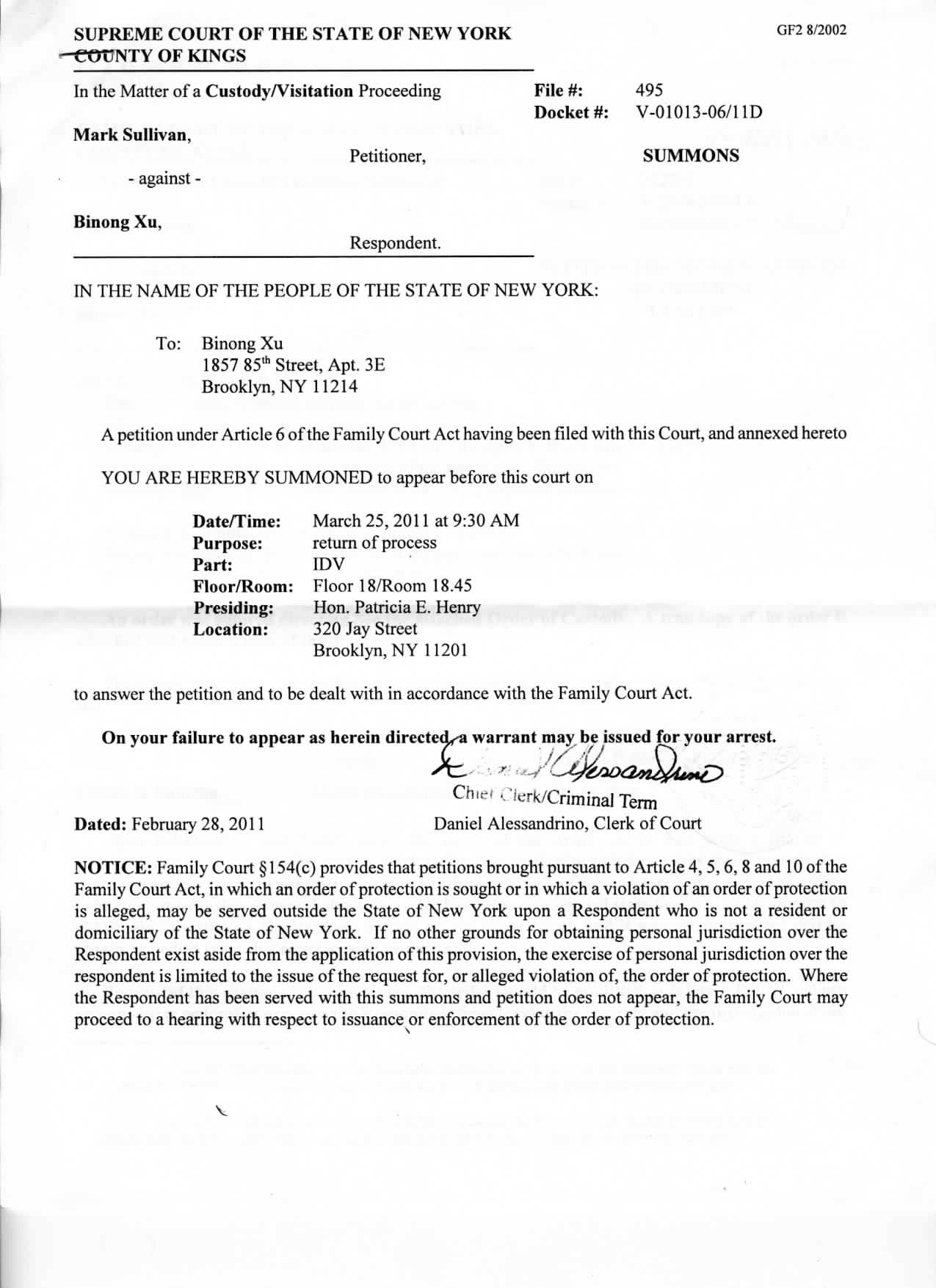
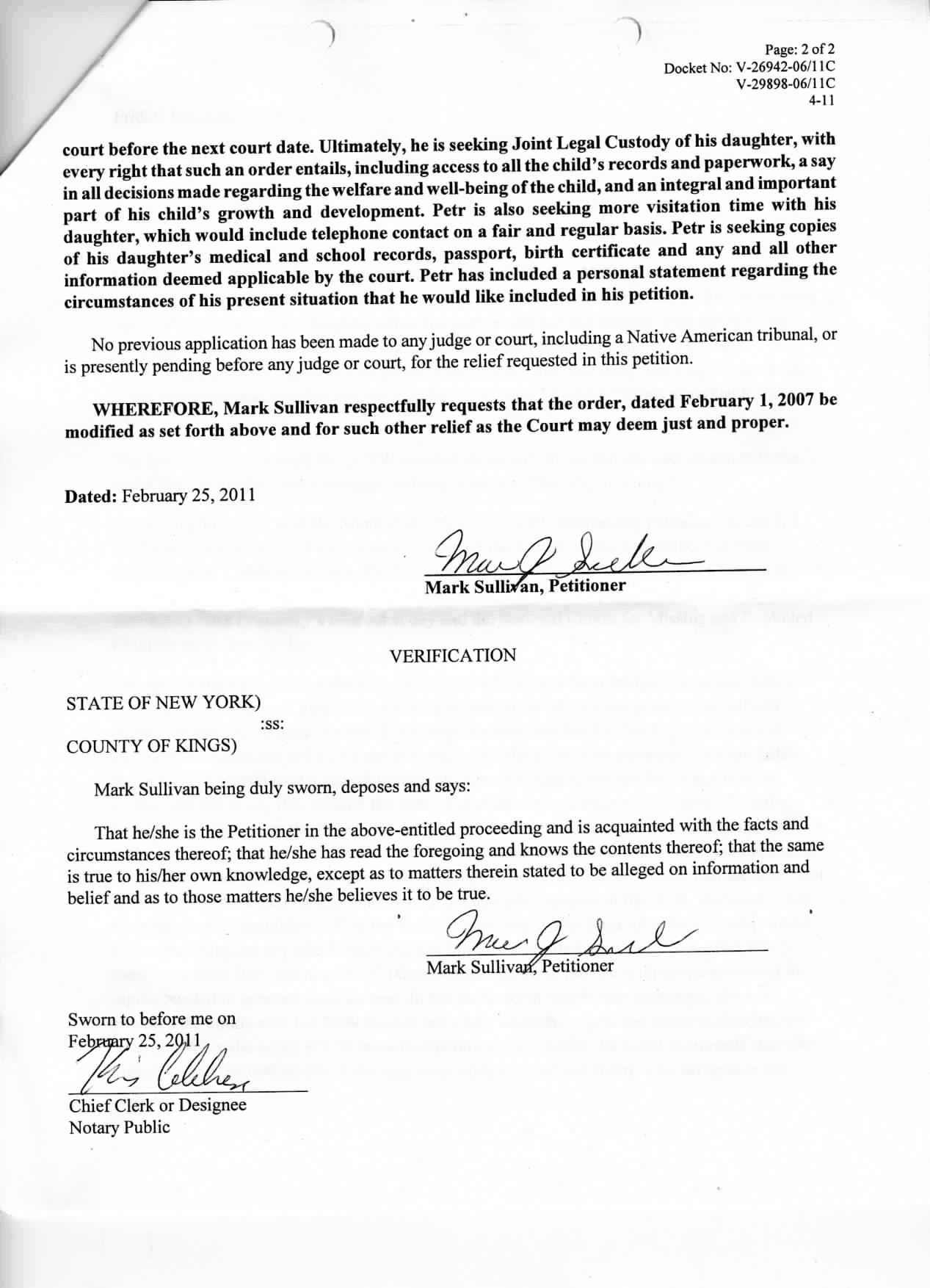
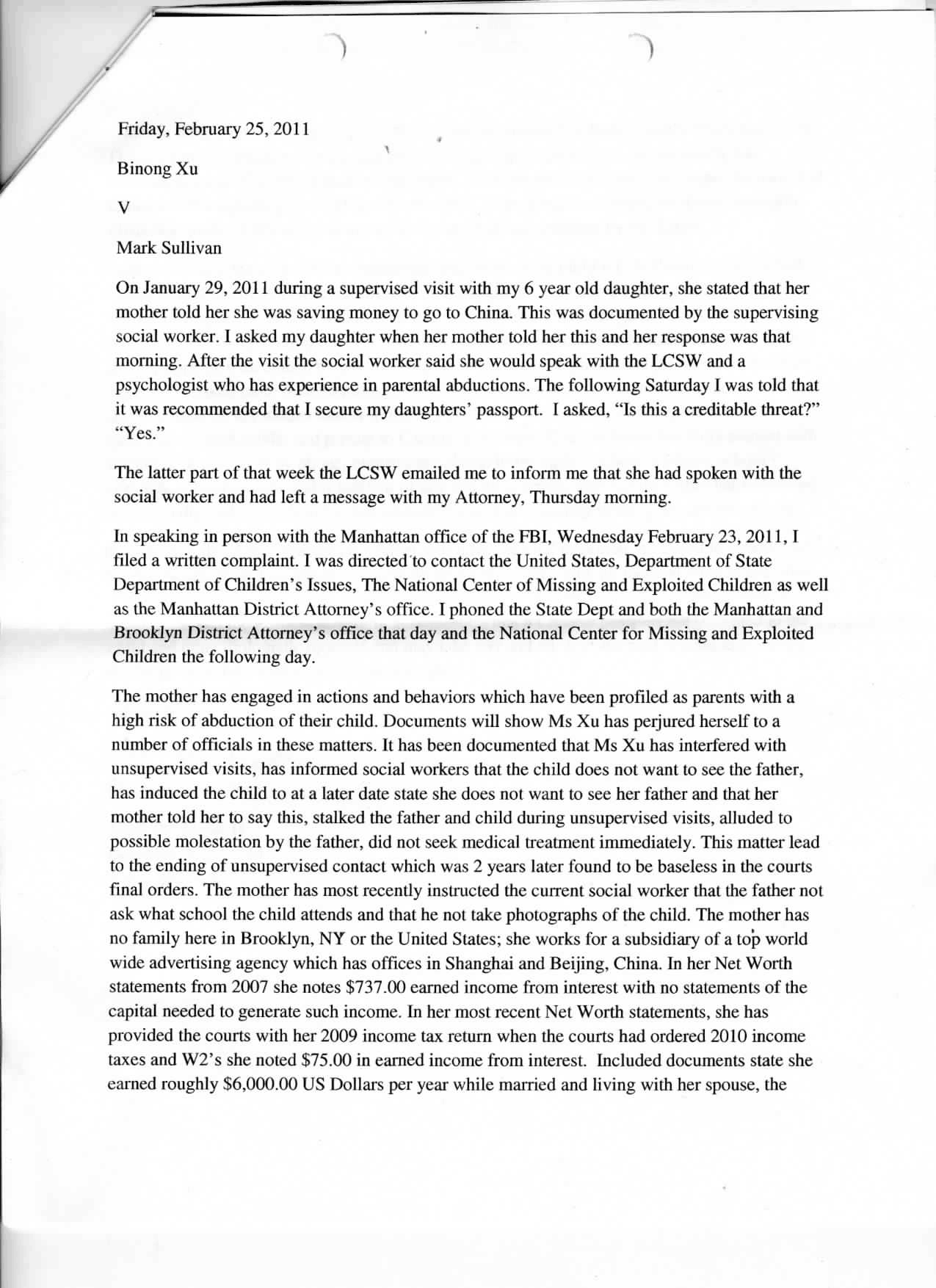
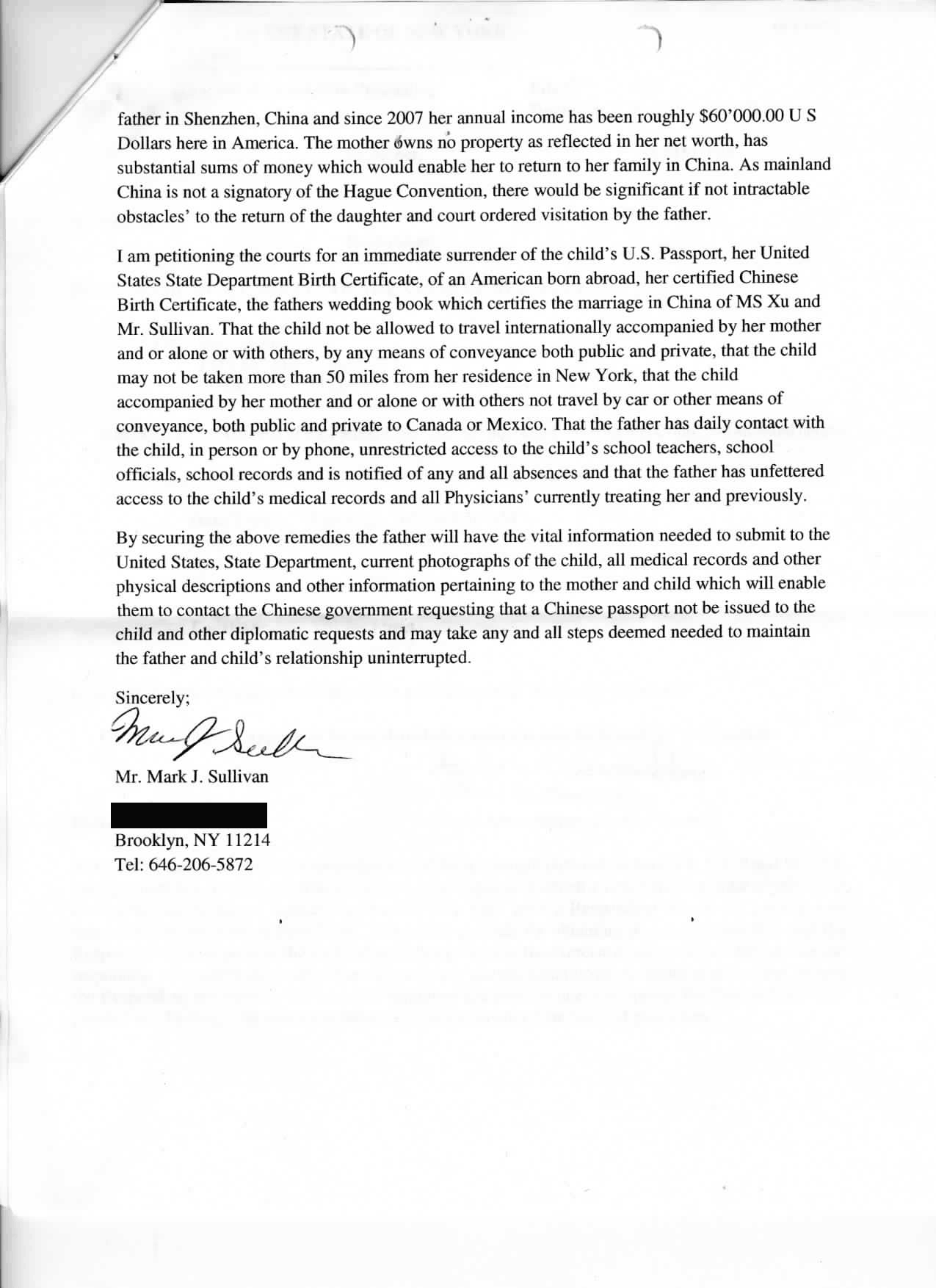
*&*
